July 2023

FOCUS
Unlocking Potential: Georgia's Journey towards Regional Development

 DR. SABINE MACHL
UN Resident Coordinator in Georgia
DR. SABINE MACHL
UN Resident Coordinator in Georgia

July 2023

Unlocking Potential: Georgia's Journey towards Regional Development

 DR. SABINE MACHL
UN Resident Coordinator in Georgia
DR. SABINE MACHL
UN Resident Coordinator in Georgia
მდგრადი განვითარება საქართველოს რეგიონებში - დროა დაჩქარდეს პროგრესი
SUSTAINABLE DEVELOPMENT IN GEORGIA’S REGIONS: TIME TO ACCELERATE
ევროკავშირის როლი საქართველოს რეგიონულ განვითარებაშიინტერვიუ პაველ ჰერჩინსკისთან
FOSTERING REGIONAL DEVELOPMENT IN GEORGIA: INSIGHTS FROM EU AMBASSADOR PAWEL HERCZYNSKI
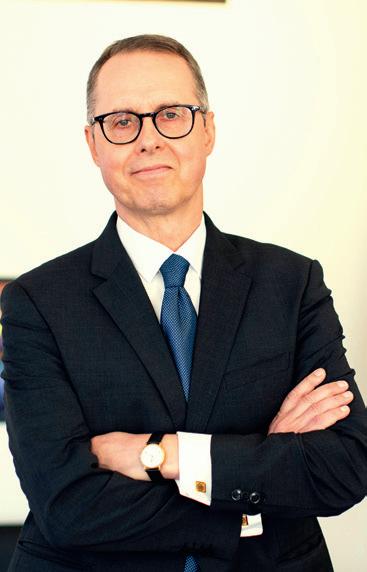
ქუთაისის საერთაშორისო აეროპორტიფანჯარა ევროპაში, ინტერვიუ საქართველოს აეროპორტების გაერთიანების დირექტორთან, ირაკლი ქარქაშაძესთან
KUTAISI INTERNATIONAL AIRPORT: A GATEWAY TO EUROPE - INTERVIEW WITH IRAKLI KARKASHADZE, DIRECTOR OF THE UNITED AIRPORTS OF GEORGIA

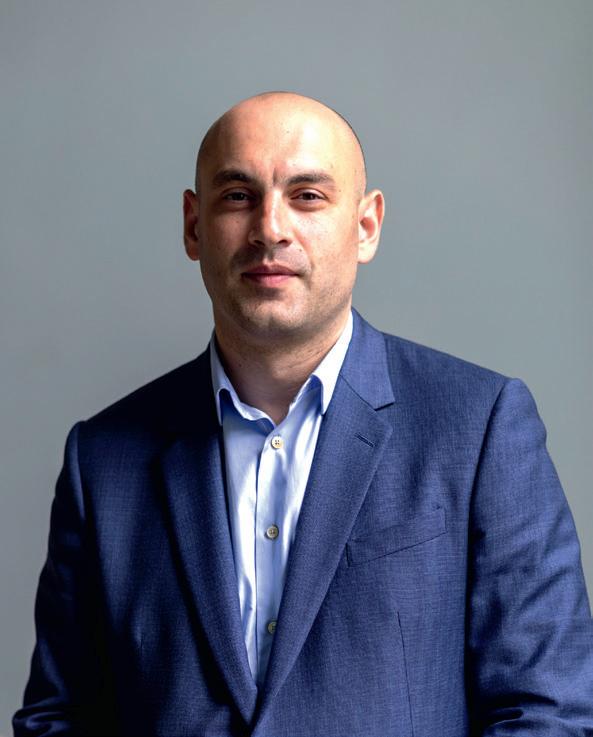
ფოთის თავისუფალი ინდუსტრიული ზონა: რეგიონული ზრდისა და ეკონომიკური ტრანსფორმაციის გაძლიერებაინტერვიუ აღმასრულებელ დირექტორთან
დავით ებრალიძესთან
POTI FREE INDUSTRIAL ZONE: EMPOWERING REGIONAL GROWTH AND ECONOMIC TRANSFORMATIONAN INTERVIEW WITH CEO DAVID EBRALIDZE
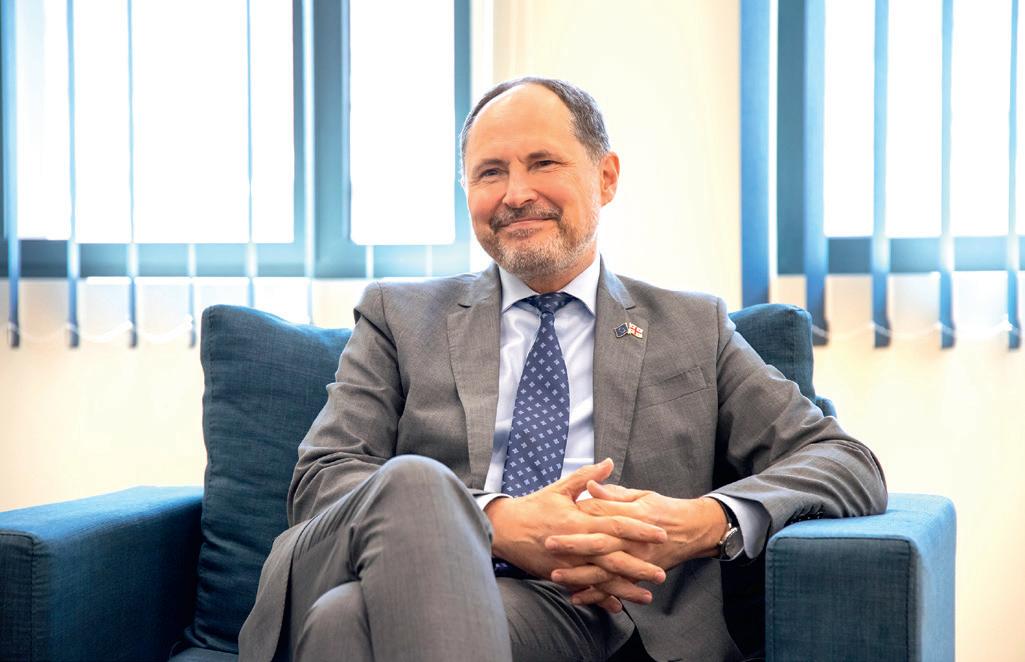
განვითარების მიმართულებით გერმანია-
საქართველოს
LONG-STANDING TRADITION OF GERMAN-GEORGIAN DEVELOPMENT COOPERATION
საფრანგეთის წვლილი საქართველოს რეგიონულ განვითარებაში
FRANCE’S COMMITMENT TO REGIONAL DEVELOPMENT IN GEORGIA
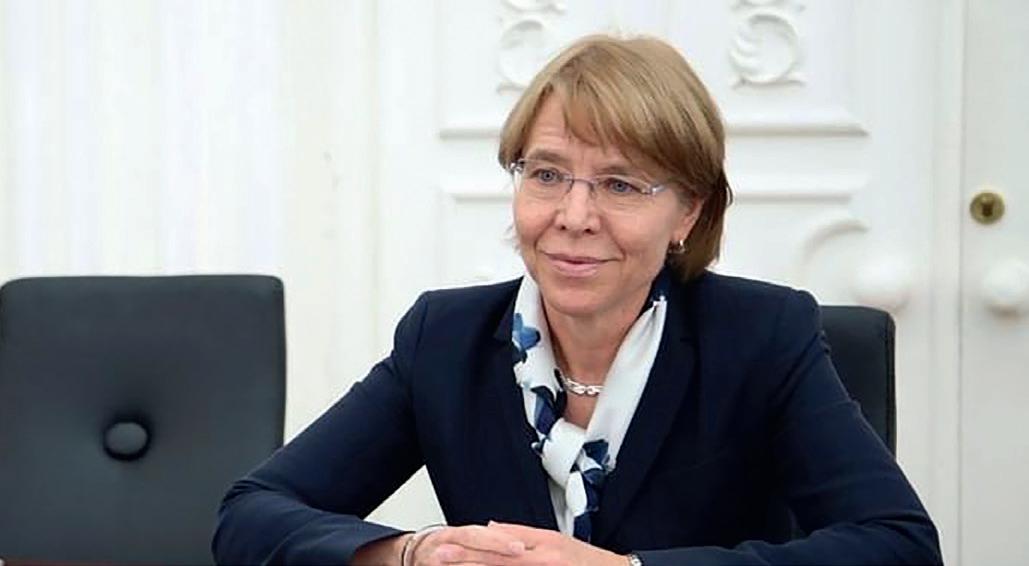
განვითარების გაძლიერება: ისრაელის
ელჩი საქართველოს რეგიონებში ისრაელის
მხარდაჭერით განხორციელებული პროექტების
შესახებ
EMPOWERING DEVELOPMENT: AMBASSADOR’S INSIGHTS ON ISRAELI COOPERATION IN GEORGIA
ელჩი მააიკე ვან კოლდამი საქართველოს
რეგიონების განვითარებაზე, გამოწვევებსა და ნიდერლანდების მხარდაჭერაზე
EXPLORING GEORGIA’S REGIONS: AMBASSADOR MAAIKE VAN KOLDAM REFLECTS ON DEVELOPMENT, CHALLENGES, AND THE NETHERLANDS’ SUPPORT
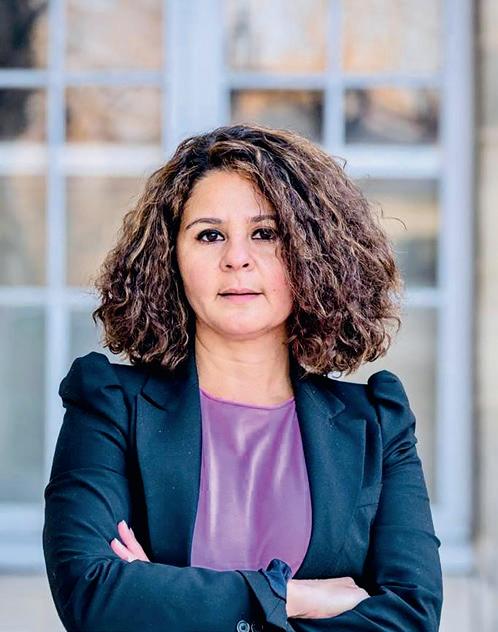

ახალგაზრდების გაძლიერება განათლების
გზით: მინდორის ძალისხმევა რეგიონებში ცვლილებებისთვის
DRIVING CHANGE IN THE REGIONS: MINDOOR’S EFFORTS TO EMPOWER YOUTH THROUGH EDUCATION
15 Shio Mghvimeli Str. Tbilisi 0179, Georgia
Editorial Commitette
info@observer.com.ge
TEL: +995 558 519 519
თითოეული რეგიონი განსხვავებული და უნიკალურია, თუმცა საერთოც ბევრი აქვთ, მაგალითად, ტრადიციები და ჩვეულებები. რაც შეეხება განვითარების წინაშე არსებულ გამოწვევებს, აქ გვხვდება როგორც მსგავსება ისე განსხვავებები.
2020 წელს, როდესაც ჩვენ ახალ ხუთწლიან მდგრადი განვითარების თანამშრომლობის სტრატეგიაზე ვმუშაობდით, მრავალი დისკუსია გავმართეთ მთავრობასთან, სამოქალაქო საზოგადოებასთან, აკადემიური სექტორის წარმომადგენლებთან და კერძო სექტორთან.
The first thought that comes to mind when I think about Georgia’s regions is their diversity. Each region is different and unique, yet they also share many traditions and customs. They also have similarities and variances when it comes to their development challenges.
In 2020, when we were developing a new five-year sustainable development strategy for the United Nations Country Team, we held numerous discussions with the government, civil society, academia and the private sector. In those deliberations it was emphasized that the UN’s work should be more focused on supporting development in the regions – we got a clear

მდგრადი განვითარება საქართველოს
რეგიონებში - დროა დაჩქარდეს პროგრესიDr. Sabine Machl, UN Resident Coordinator in Georgia
უნდა იყოს ორიენტირებული რეგიონების განვითარების ხელშეწყობაზე – მივიღეთ მკაფიო გზავნილი, გავიდეთ დედაქალაქიდან და
უფრო მეტი ვიმუშავოთ რეგიონებთან. გაეროს სააგენტოთა ჯგუფს,
მდივნის წარმომადგენელი, და რომელიც
გაეროს თვრამეტ სააგენტოს უკვე გვქონდა შვიდი ვიზიტი საქართველოს რეგიონებში მათი პრიორიტეტების, გამოწვევებისა და შესაძლებლობების შესასწავლად. გადაწყვეტილი გვაქვს, ვიმოქმედოთ იმ მიზნების რეალიზაციისთვის, რაც ერთობლივად განვაცხადეთ მთავრობასთან, პირველ რიგში ხალხის კეთილდღეობის, შესაძლებლობების გაუმჯობესებასა და სოციალური თანასწორობის ხელშეწყობისთვის. ღია დისკუსიები ადგილობრივ დაინტერესებულ მხარეებთან - ხელისუფლების წარმომადგენლებთან, სამოქალაქო საზოგადოების წარმომადგენლებთან, მეცნიერებთან, მეწარმეებთან, ფერმერებთან და ახალგაზრდებთან - შესაძლებლობას იძლევა გამოავლინოს პრობლემები, იპოვოს გამოსავალი აღნიშნული გამოწვევების
We held numerous discussions with the government, civil society, academia and the private sector. In those deliberations it was emphasized that the UN’s work should be more focused on supporting development in the regions – we got a clear message to move beyond the capital Tbilisi.
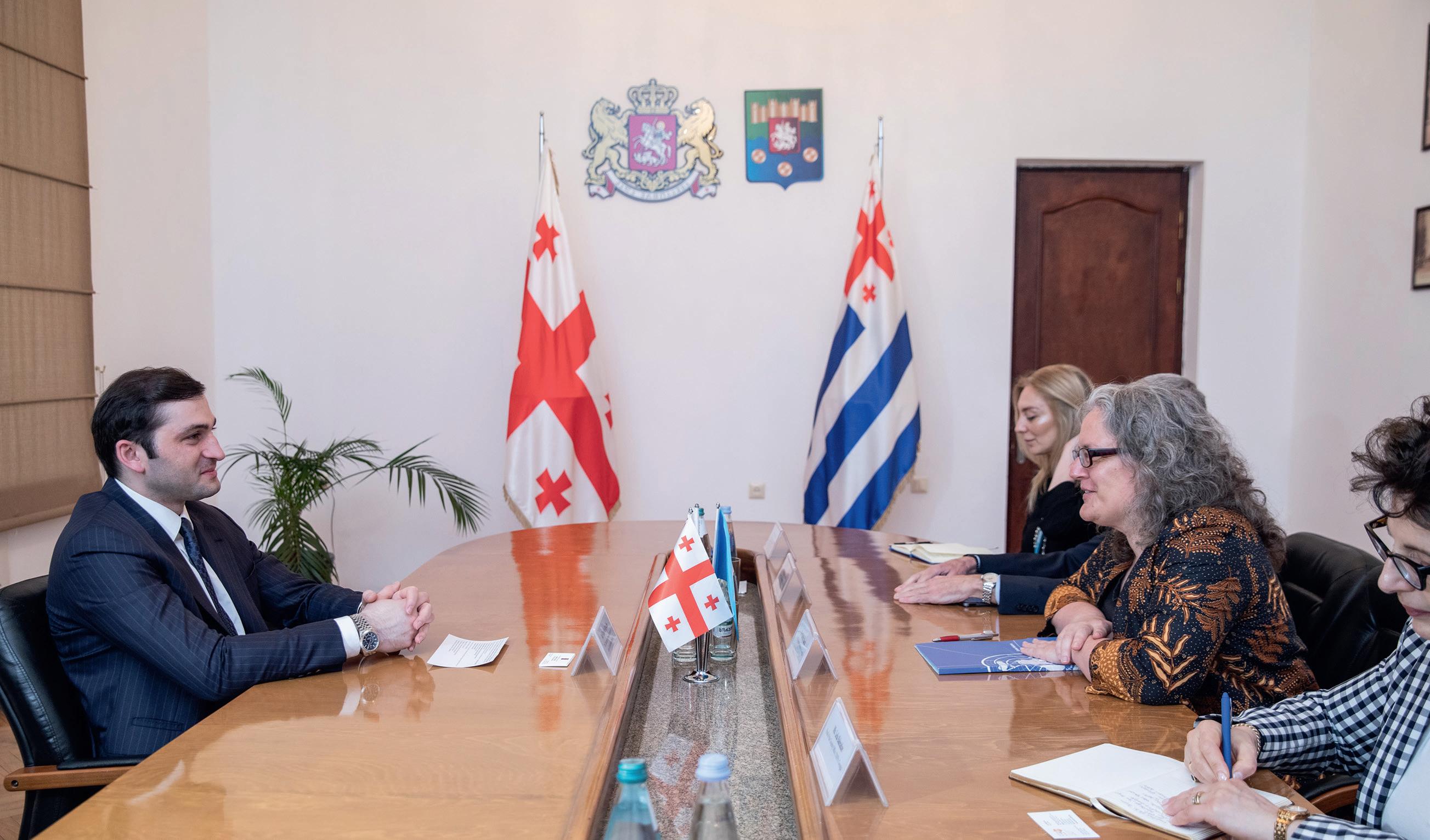
message to move beyond the capital Tbilisi.
და გაეროს მუშაობა საქართველოში
წარმომადგენლებთან და კერძო სექტორთან. შეხვედრებზე ხაზგასმით აღინიშნა, რომ გაეროს მუშაობა უფრო მეტად
Together with colleagues from the eighteen UN entities in the Country Team in Georgia, which I lead as the representative of the UN Secretary-General, we have already organised seven dedicated visits to the regions of Georgia to understand their priorities, challenges and opportunities. We are determined to move towards fulfilling the goals we have jointly declared with the Government, primarily improving the people’s wellbeing, capabilities and promoting social equality. The open discussions with local stakeholders – government officials, civil society representatives, scientists, entrepreneurs, farmers, and young people – always provide opportunities to identify concerns, reaffirm commitments to address challenges and to align the UN work in Georgia with the current national and local policies and priorities.
Some regions are growing, in particular those with a big tourism development potential, whereas in some others growth is not as fast or as inclusive as needed. Almost all regions have been experiencing demographic decline, not least due to internal and external migration. The share of young people who are neither in employment, nor in education or training is something that we are trying to address through the UN programmes. Regional economies continue to mostly rely on low productivity sectors. On the positive side, many local actors
ზოგიერთი რეგიონი ვითარდება, განსაკუთრებით ის, ვისაც ტურიზმის განვითარების დიდი პოტენციალი აქვს, მაშინ როცა სხვა რეგიონებში არ არის ისეთი სწრაფი ან ინკლუზიური ზრდა, როგორიც საჭიროა. თითქმის ყველა რეგიონი განიცდის დემოგრაფიულ ვარდნას, განსაკუთრებით შიდა და გარე მიგრაციის გამო. ახალგაზრდები

რომლებიც არც დასაქმებულნი არიან და არც საგანმანათლებლო ინსტიტუტებში ირიცხებიან, არის ის სეგმენტი, რომლისკენაც გვსურს გაეროს პროგრამები მივმართოთ. რეგიონული ეკონომიკა კვლავაც ძირითადად ეყრდნობა დაბალი პროდუქტიულობის სექტორებს. დადებითი ის არის, რომ ბევრი ადგილობრივი აქტორი იწყებს ახალ ბიზნესს და სოციალური ინოვაციების ინიციატივებს და იკვლევს ახალი დაფინანსების მექანიზმებს, რომლებიც მორგებულია მათი თემის საჭიროებებზე.
განვითარებაში მნიშვნელოვანი და მდგრადი პროგრესი კვლავ გამოწვევად რჩება მსოფლიოში არსებული ვითარების გათვალისწინებით. ჩვენს ეროვნულ და საერთაშორისო პარტნიორებთან ერთად, ვეხმარებით საქართველოს გააძლიეროს ცენტრალური და ადგილობრივი ხელისუფლების და სხვა ინსტიტუტების შესაძლებლობები და უზრუნველყოს აუცილებელი სერვისების მიწოდება ყველა ადამიანისთვის. ჩვენს ქართველ პარტნიორებთან ერთად ვმუშაობთ ადამიანთა უფლებების და კეთილდღეობის დასაცავად.
ჩვენი ძალისხმევა მიმართულია ფერმერებისთვის ეკონომიკური შესაძლებლობების შექმნაზე სოფლის მეურნეობის სექტორში, ადგილობრივი მცირე და საშუალო საწარმოების მხარდაჭერაზე, მეწარმეობაში ხალხის ჩართვაზე მათი შესაძლებლობების გაზრდის გზით და მათი ჩართვით თანატოლთა განათლებასა და საზოგადოებრივ საქმიანობაში. ხალხი მთელი საქართველოს მასშტაბით იძენს უნარებს, დაიწყონ ან გააფართოვონ ტურიზმთან დაკავშირებული და მცირე სასოფლო-სამეურნეო ბიზნესი, გადააქციონ თავიანთი იდეები რეალურ პროექტებად და გამოიმუშაონ შემოსავალი. მაგალითად, „რეგიონული და ადგილობრივი განვითარების ხელშეწყობის“
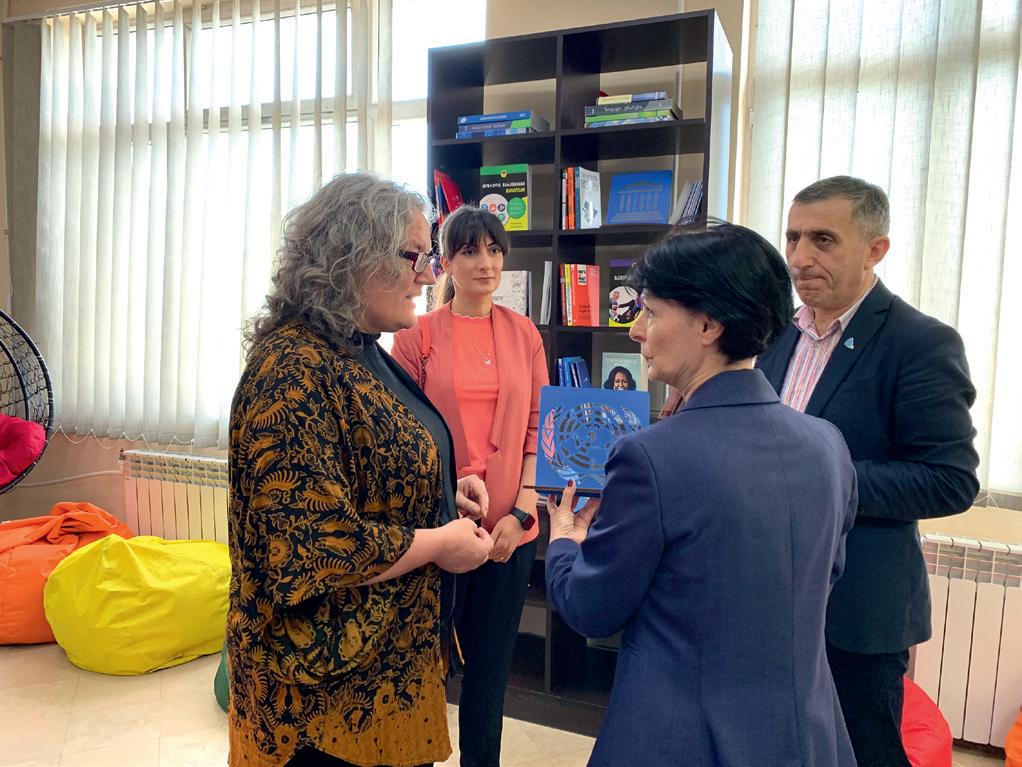
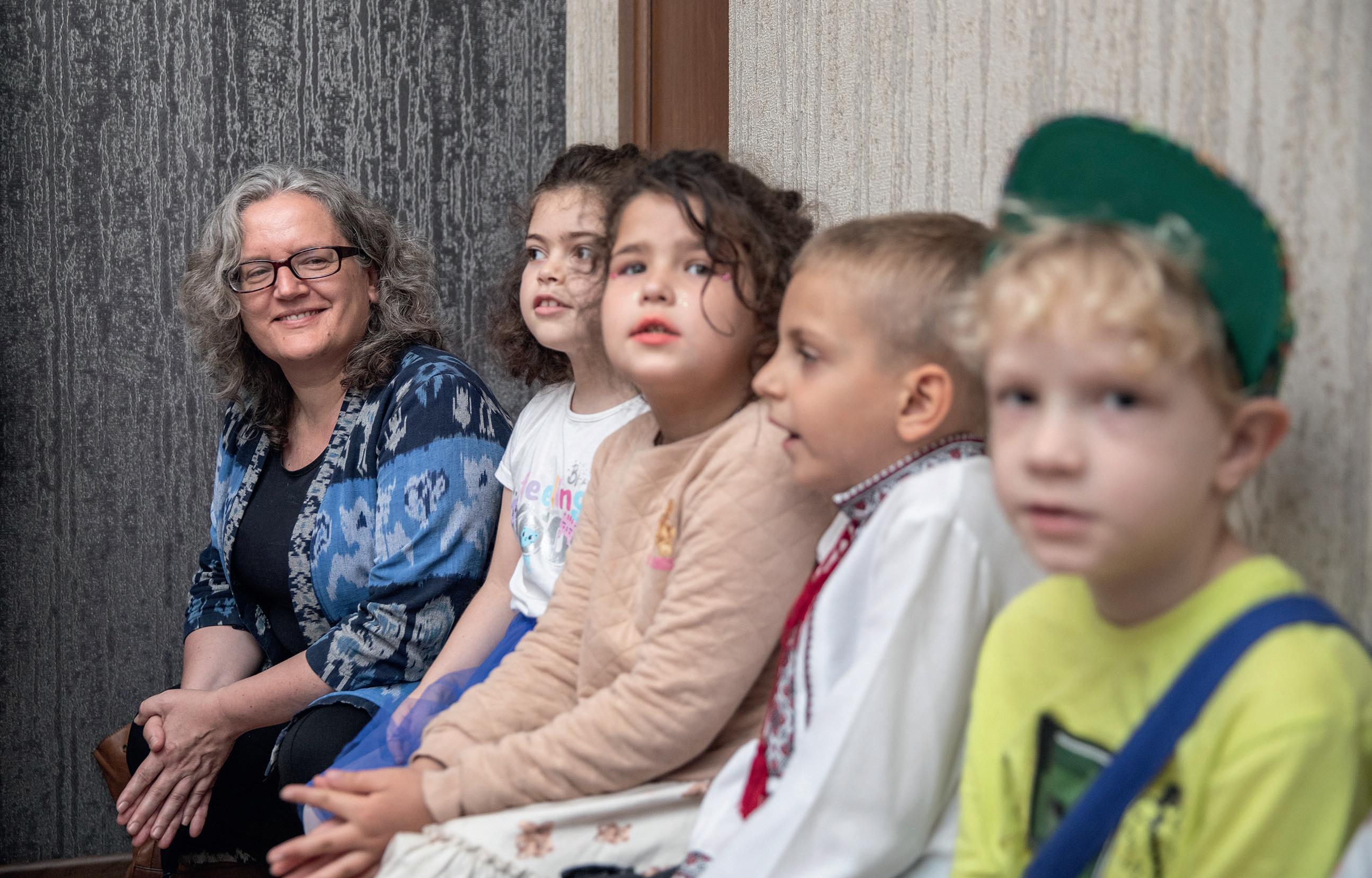
initiate new businesses and social innovation initiatives and explore new financing mechanisms tailored to the needs of their communities.
Meaningful and sustained progress on development remains challenging given the current situation in the world. Along with our national and international partners, the UN is helping to strengthen the capacity of the central and local authorities and other institutions to provide essential services to all people. Together with our Georgian partners, we are working to protect human rights and the wellbeing of all.
შექმნაში და პირდაპირი სარგებელი მოუტანა 14 000-ზე მეტ მოქალაქეს 23 მუნიციპალიტეტში.
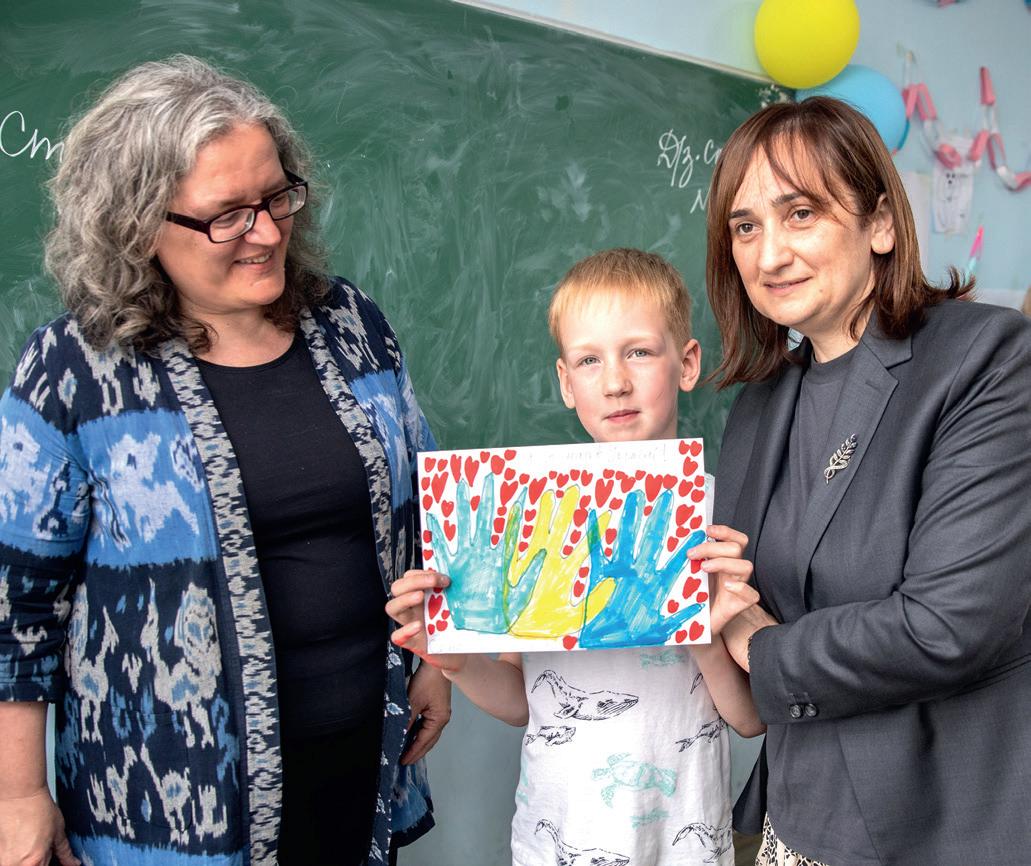
ცხოვრების დონის გასაუმჯობესებლად ვმუშაობთ ძირითადი სოციალური და ჯანდაცვის სერვისებისა და ინფრასტრუქტურის
საფუძველი რეგიონებში შეზღუდული შესაძლებლობის მქონე პირთა და ხანდაზმულთა ინტეგრირებული სოციალური სერვისებისთვის. გაეროს ქალთა ორგანიზაციამ (UN Women), გაეროს ადამიანის უფლებათა უმაღლესი კომისრის ოფისმა (OHCHR), ჯანდაცვის მსოფლიო ორგანიზაციამ (WHO), გაეროს მოსახლეობის ფონდმა (UNFPA), გაეროს ბავშვთა ფონდმა (UNICEF) და გაეროს განვითარების პროგრამამ გააერთიანეს ძალები, რათა გააუმჯობესონ შეზღუდული შესაძლებლობის მქონე
რაც უზრუნველყოფს ადგილობრივ მოსახლეობას, მათ შორის შშმ ქალებსა და გოგონებს, ისარგებლონ მათი უფლებების შესახებ გაუმჯობესებული ცოდნით, უკეთესი პოლიტიკითა და საზოგადოების უფრო ინკლუზიური დამოკიდებულებით. ევროკავშირის მიერ დაფინანსებული ციფრული ჯანმრთელობის ინიციატივით, გაეროს საპროექტო სერვისების ოფისი (UNOPS), WHO, UNFPA და UNICEF საქართველოს მთავრობასთან ერთად უზრუნველყოფს პირველადი ჯანდაცვის ხელმისაწვდომობას სოფლად ჯანდაცვის სფეროში ციფრული ჯანმრთელობისა და ტელემედიცინის სერვისების გამოყენების ხელშეწყობით.
სულ რაღაც ორი კვირის წინ დავბრუნდი აჭარიდან, სადაც გაეროს ათწლეულის მხარდაჭერა ორიენტირებულია ძლიერი, ღია და გამჭვირვალე ადგილობრივი მმართველობის ხელშეწყობაზე და სოფლის მდგრადი განვითარების მიღწევაზე. გაერო ყურადღებას ამახვილებს არაჩვეულებრივი ბუნებრივი მემკვიდრეობის შენარჩუნებაზე, ეკოლოგიური ტურიზმისა და ბიომეურნეობის ხელშეწყობაზე, განახლებადი ენერგიის წყაროების გამოყენების ინოვაციური მიდგომების პილოტირებაზე და კეთილდღეობის გაუმჯობესებაზე. საქართველოს მთები, მდინარეები და სანაპირო ზოლები, კულტურული და ისტორიული მემკვიდრეობა, დახვეწილი სამზარეულო და მეგობრული ხალხი უზარმაზარ პოტენციალს იძლევა
Our efforts are directed towards creating economic opportunities in the agriculture sector for farmers along various value chains, supporting local small and medium-sized enterprises, engaging people in entrepreneurship through increasing their capacities and engaging them in peer education and community activities. People across Georgia obtain the skills to start or expand their tourism-related and small agricultural business activities, to transform their ideas into real projects, and to generate income. For example, the ‘Fostering Regional and Local Development’ programme implemented by the UN Development Programme (UNDP) from 2018 to 2021 with funds from the governments of Austria and Switzerland helped create much-needed employment opportunities, bringing direct benefits to over 14,000 citizens in 23 municipalities.
We also have worked to improve living standards by upgrading basic social and healthcare services and infrastructure. Our team established a solid and sustainable foundation for integrated social services for persons with disabilities and older persons in the regions. The UN Entity for Gender Equality and the Empowerment of Women (UN Women), the Office of the UN High Commissioner for Human Rights (OHCHR), the World Health Organization (WHO), the UN Population Fund (UNFPA), the UN Children’s Fund (UNICEF), and UNDP joined forces to improve access of persons with disabilities to social services and employment. Two Social Inclusion Centers were opened in Ambrolauri and Khobi ensuring that the local population, including women and girls with disabilities, benefitted from improved knowledge on their rights, better policies and more inclusive public attitudes. Through the EU-funded initiative on digital health, the UN Office for Project Services (UNOPS), WHO, UNFPA, and UNICEF together with the Government of Georgia ensure access to primary health care by promoting the use of digital health and telemedicine services among healthcare providers and the population, especially in rural areas.
Just a couple of weeks ago, I returned from Adjara, where the decade-long support of the UN is focused on promoting
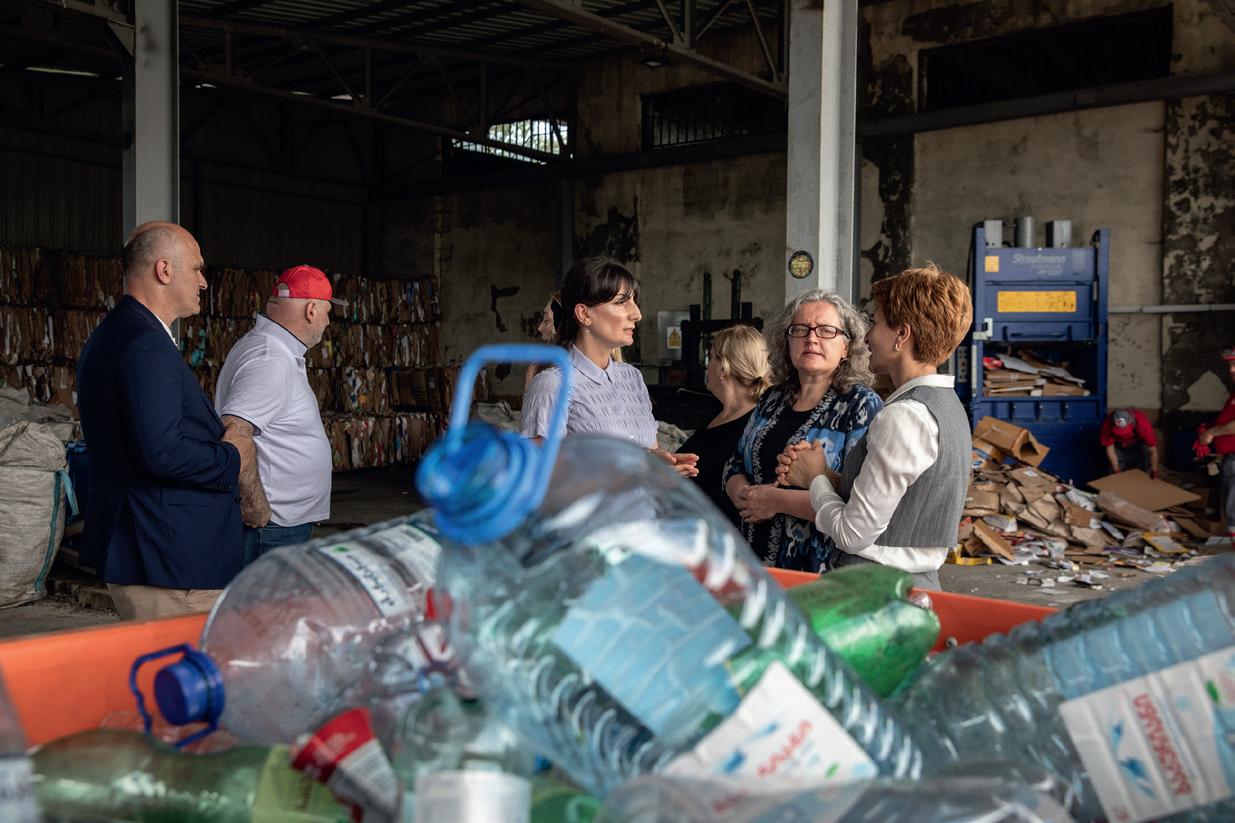
ავსტრიისთვის, და მე მჯერა, რომ მდგრადი
არის ადგილი, რომ გაფართოვდეს და გაიზარდოს ღირებულების
საქართველოშიც, რაც სარგებელს მოუტანს ბევრ თემს მთელი ქვეყნის მასშტაბით. კიდევ ერთი სფერო, რომელსაც მინდა ხაზი გავუსვა არის ნარჩენების მართვა: ნარჩენების
ნარჩენებს ახარისხებენ და აგზავნიან ხელახლა გამოსაყენებლად, მოსამზადებლად ან გადასამუშავებლად, თუნდაც პატარა სოფლებში. მოხარული ვართ, რომ ბათუმის მუნიციპალიტეტმა ჩვენი მხარდაჭერით გადადგა
strong, open and transparent local governance and achieving sustainable rural development. The UN focuses on preserving the extraordinary natural heritage, promoting environmental tourism and bio-farming, piloting innovative approaches to the usage of renewable energy sources and improving welfare. Georgia’s mountains, rivers and coastlines, cultural and historical heritage, exquisite cuisine and friendly people provide a huge potential for tourism development. Sustainable tourism is an important industry for my home country Austria, and I believe there is room for sustainable tourism to expand and move up the value chain in Georgia as well, benefitting many communities across the country. Another area that I would like to highlight is waste management: reducing, reusing and recycling of waste is important for the environment globally. In Austria, waste is sorted and sent for re-use preparation or recycling even in small villages. We are glad that with our support Batumi municipality has taken the first steps in the same direction and started building a sophisticated system of collection, separation, and recycling of waste. We are committed to further supporting re-
სისტემის მშენებლობა. მზად ვართ კვლავ დავუჭიროთ მხარი რეგიონულ და ადგილობრივ ინოვაციურ, ეკოლოგიაზე ორიენტირებულ ინიციატივებს. ამ მხრივ, მნიშვნელოვანია ხაზგასმით აღვნიშნოთ, რომ გადამუშავება ეხება არა მხოლოდ ტექნოლოგიასა და ლოჯისტიკას, არამედ პიროვნების წახალისებასაც.
ადგილობრივი თვითმმართველობის რეფორმის წინსვლისთვის გაერო მჭიდროდ თანამშრომლობს რეგიონული განვითარებისა და ინფრასტრუქტურის სამინისტროსთან, განვითარების პარტნიორებთან და მუნიციპალურ ხელისუფლებასთან მთელი საქართველოს მასშტაბით. კერძოდ, ჩვენ ვამაყობთ ჩვენი ძალისხმევით, რათა დავეხმაროთ საქართველოს პოლიტიკისა და კანონმდებლობის, რეგიონული და მუნიციპალური სტრატეგიებისა
Some regions are growing, in particular those with a big tourism development potential, whereas in some others growth is not as fast or as inclusive as needed. Almost all regions have been experiencing demographic decline, not least due to internal and external migration.
gional and local innovative, environmentally friendly initiatives. In this regard, it is important to emphasize that recycling is not only about technology and logistics, but also about incentives for individuals to make efforts to recycle.
To help advance the local government reform, the UN has
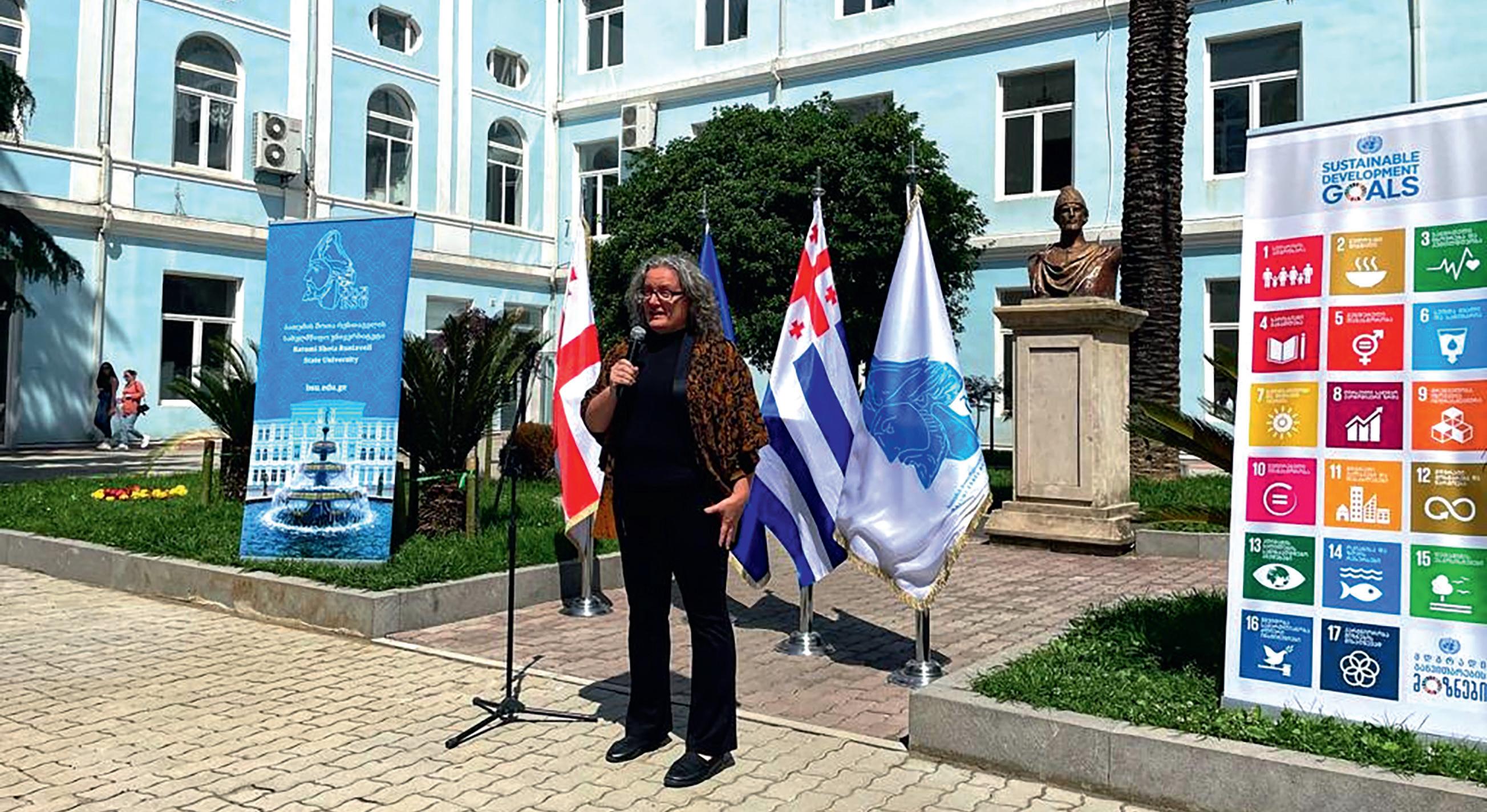
შეგროვების ხარისხის გაუმჯობესებაში და, რაც მთავარია, მხარი დავუჭიროთ პოზიტიურ ცვლილებებს ადგილობრივი მოსახლეობის საარსებო წყაროებში. ყველა ამ აქტივობის საფუძველია ადგილო-
მთავრობების შესაძლებლობების შექმნა, რათა ეფექტურად მართონ ტერიტორიული და ურბანული განვითარება, განახორციელონ მეტი სტრატეგიული საჯარო ინვესტიციები და ადგილობრივ დონეზე გაზარდონ პირდაპირი ხელმისაწვდომობა საერთაშორისო დონორების დაფინანსებაზე. 2022 წელს UNDP-მა და გერმანიის განვითარების სააგენტომ Deutsche Gesellschaft für Internationale Zusammenarbeit, რეგიონული განვითარებისა და ინფრასტრუქტურის სამინისტროსთან და ადგილობრივ ხელისუფლებასთან მჭიდრო პარტნიორობით, დაიწყეს 9,5 მილიონი ევროს ღირებულების „ინტეგრირებული ტერიტორიული განვითარების“ (EU4ITD) პროგრამის განხორციელება დეცენტრალიზებული მმართველობის, სოციალური ერთობის მხარდასაჭერად და ინკლუზიური ეკონომიკური ზრდისთვის საქართველოს რეგიონებში. კეთილდღეობის, დემოკრატიისა და მდგრადობის გასაძლიერებლად, საქართველომ სრულად უნდა აღჭურვოს ადგილობრივი მთავრობები ადგილობრივი განვითარების ხელშეწყობისთვის, ადგილობრივი თემების გადაწყვეტილების მიღებაში ჩასართავად, განავითაროს სახელმწიფო-კერძო და რეგიონთაშორისი პარტნიორობა ეფექტური საჯარო ინვესტიციების განსახორციელებლად, რაც ხელს შეუწყობს მდგრადი განვითარების მიზნების მიღწევას. რეგიონებს უნდა ჰქონდეთ ხმა გადაწყვეტილების მიღებისას მათი მდგრადი მომავლისთვის, რადგან მათ საუკეთესოდ ესმით თავიანთი გამოწვევები და იციან რა არის მნიშვნელოვანი იქ მცხოვრები და მომუშავე ადამიანებისთვის უკეთესი შედეგების მისაღწევად.
ადგილობრივი მმართველობის რეფორმა საქართველოს მთავრობას აძლევს შესაძლებლობას შეამციროს რეგიონული უთანასწორობა და ფარდობითი

სარგებელი და გააძლიეროს სამოქალაქო შესაძლებლობები. ჩვენ მოუთმენლად ველით გავაგრძელოთ მუშაობა ჩვენს ეროვნულ და ადგილობრივ პარტნიორებთან მთელი საქართველოს მასშტაბით, რათა მივაღწიოთ რეალურ
been working closely with the Ministry of Regional Development and Infrastructure, development partners, and municipal governments around Georgia. In particular, we are proud of our efforts to help Georgia develop policies and legislation, regional and municipal strategies and action plans, improve the quality of municipal service delivery and data collection and, most importantly, support positive changes to the livelihoods of local residents. At the heart of all these activities is building capacity of the local governments to to effectively manage territorial and urban development, make more strategic public investments, and increase direct access at the local level to funding from international donors. In 2022, UNDP and the German development agency Deutsche Gesellschaft für Internationale Zusammenarbeit in close partnership with the Ministry of Regional Development and Infrastructure and local authorities started implementing the EUR 9.5 million ‘Integrated Territorial Development’ (EU4ITD) programme to support decentralized governance, social cohesion and inclusive economic growth in Georgia’s regions.
To strengthen prosperity, democracy and resilience, Georgia needs to fully equip local governments with powers to promote local development, engage local communities in decision-making, develop public-private and region-to-region partnerships to realize effective public investments that help to meet the Sustainable Development Goals. Regions need to have a voice in decision-making for their sustainable future as they best understand their unique challenges and what is important for them to build greater outcomes for the people who live and work there.
Local governance reform presents the Government of Georgia with an opportunity to reduce regional inequalities and relative poverty, to harness the benefits of economic diversification, and to strengthen civic capacities. We look forward to continuing our work in close partnership with our national and local partners all over Georgia to achieve real impact and to foster development that creates more opportunities for all.
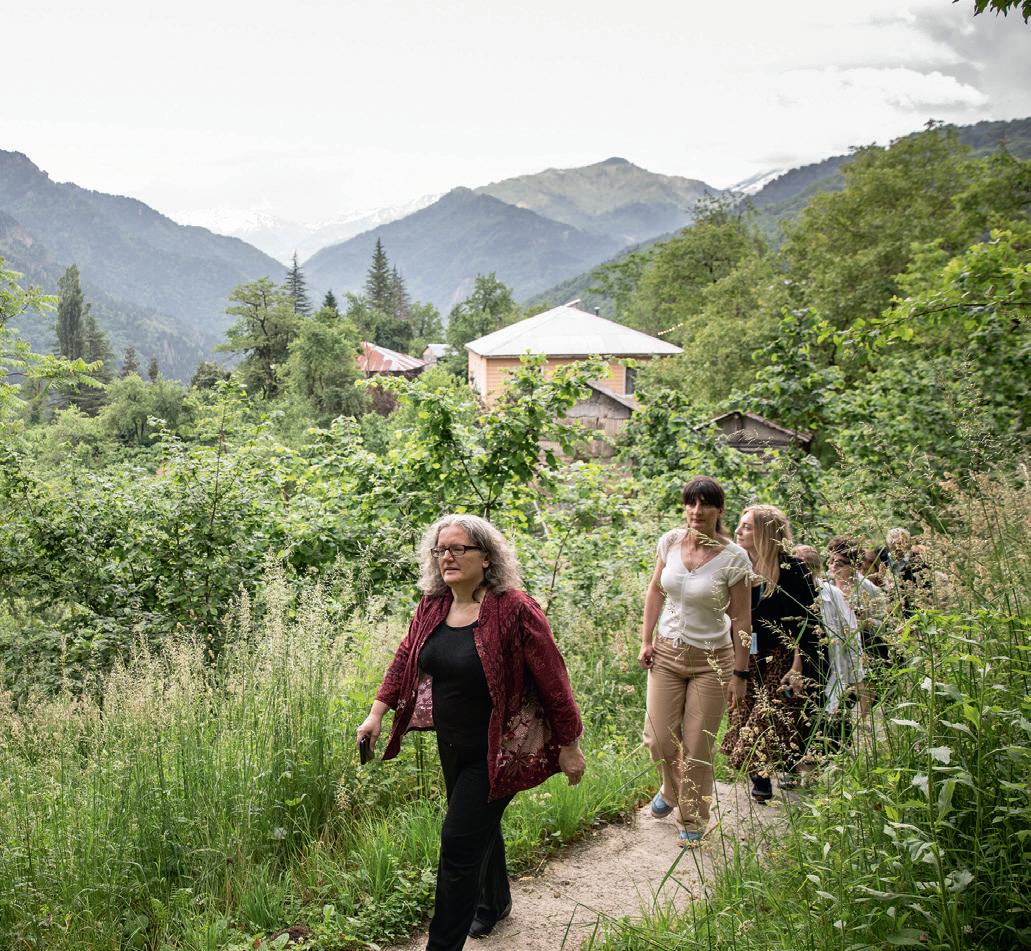
თავის შთაბეჭდილებებსა და შეხედულებებს ქვეყანაში
არ ჰქონია ყველა რეგიონის მონახულების შესაძლებლობა, თუმცა, მის გეგმებშია შეისწავლოს და გაიაზროს საქართველოს შიგნით არსებული მრავალფეროვნება. თავისი დიდი გამოცდილებით და ევროკავშირის თანმიმდევრული პოლიტიკის გაგებით, ელჩი გვიზიარებს მნიშვნელოვან პერსპექტივებს საქართველოში რეგიონული განვითარების ამჟამინდელი მდგომარეობისა
In this interview, we had the opportunity to speak with the EU Ambassador to Georgia, Pawel Herczynski, who shared his impressions and insights on regional development in the country. Ambassador Herczynski has been serving in Georgia for nearly a year, and while he regrets not having the opportunity to visit all the regions yet, he remains committed to exploring and understanding the diversity within Georgia. With his extensive experience and understanding of the European Union’s cohesion policy, the Ambassador provides valuable perspectives on the current state of regional development in Georgia and its potential for growth. Additionally, he emphasizes the importance of creating a positive perception

როლი საქართველოს რეგიონულ
ინტერვიუ პაველ ჰერჩინსკისთან
ევროინტეგრაციისკენ მიმავალ
დადებითი მოვლენების შექმნის აუცილებლობაზე საუბრობს.
Diplomat-ის ამ ნომერში აქცენტს ვაკეთებთ საქართველოს რეგიონული განვითარებაზე და პარტნიორებისა და ორგანიზაციების სხვადასხვა წვლილზე. სანამ თემას ჩავუღრმავდებით, იქნებ გაგვიზიაროთ თქვენი შთაბეჭდილებები სხვადასხვა რეგიონებზე და რომელმა რეგიონმა მოახდინა თქვენზე ყველაზე დიდი შთაბეჭდილება და რატომ? პირველ რიგში, უნდა აღვნიშნო, ძალიან ვწუხვარ, რომ მიუხედავად
ჩვენ ვფინანსებთ სხვადასხვა აქტივობებსა და პროექტებს, რომლებიც ხელს უწყობენ ამ მიზნის მიღწევას.
მოვახერხე ყველა რეგიონის მონახულება. თუმცა, ჩემს გეგმებშია, სათითაოდ მოვინახულო საქართველოს ყველა რეგიონი. პირველი თვეები საკმაოდ დატვირთული იყო სხვადასხვა ვალდებულებებით, მათ შორის პოლიტიკური პარტიების ლიდერებთან და საპარლამენტო კომიტეტებთან შეხვედრებით, ასევე მაღალი დონის
of Georgia and the need for good news to emerge from the country as it progresses towards European integration.
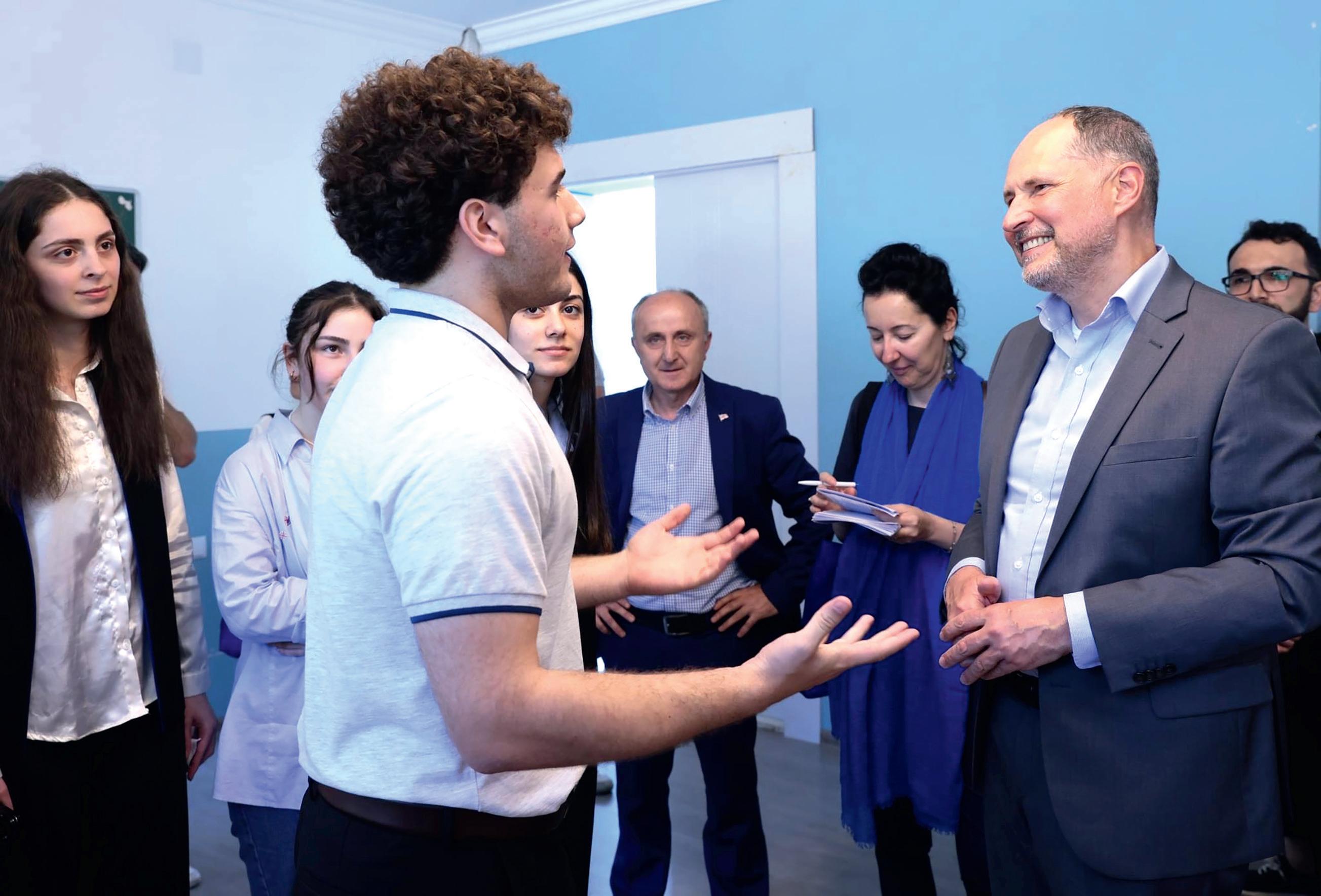
The upcoming issue of Diplomat focuses on regional development in Georgia and different contributions of partners and organizations. Before we delve into the topic, could you please share your impressions of different regions and which region has made the greatest impact on you and why?
First, I have to say that I’m really sorry that in spite of being in Georgia for nearly a year, I still haven’t visited all the regions. However, I am committed to visiting each region of Georgia one by one. The first couple of months were quite busy with various commitments, including meetings with political party leaders and parliamentary committees, as well as high-level visits. Nonetheless, I managed to visit Imereti, we went to Kutaisi and a few weeks ago I visited Batumi and some smaller places in the mountains of Adjara. I also had the opportunity to accompany the Speaker of the Parliament on a trip to Kakheti for wine harvesting with other ambassadors. Although I have
Our focus is on promoting balanced regional development, and we have been providing financial support to various activities and projects that contribute to this goal.
ვიზიტებით. მიუხედავად ამისა, მოვახერხე იმერეთის მონახულება, წავედით ქუთაისში და რამდენიმე კვირის წინ ბათუმს და აჭარის მთიანეთის რამდენიმე პატარა სოფელსაც ვეწვიე. ასევე მქონდა შესაძლებლობა სხვა ელჩებთან ერთად საქართველოს პარლამენტის თავმჯდომარის მიერ მიწვეული ვყოფილიყავი კახეთში ყურძნის მოსავლის აღებისთვის.
მიუხედავად იმისა, რომ ჯერ სულ რამდენიმე რეგიონში ვარ ნამყოფი, ვგრძნობ საჭიროებას, მეტი დრო გავატარო და უფრო გრძელი მოგზაურობები მქონდეს რეგიონებში, რათა ჭეშმარიტად გავიგო საქართველოს მრავალფეროვნება. ბევრი გეგმა მაქვს აქ ყოფნის ფარგლებში სხვადასხვა რეგიონების შესწავლასთან დაკავშირებით და იმედი მაქვს,
მდგომარეობას და თქვენი აზრით, რა მიმართულებით აქვს გაუმჯობესების პოტენციალი?
დედაქალაქში მოსახლეობის დიდი კონცენტრაცია საქართველოს ერთ-ერთი ყველაზე დიდი გამოწვევაა. საქართველოს მოსახლეობის თითქმის ნახევარი ცხოვრობს დედაქალაქში, სადაც განთავსებულია პარლამენტის, მთავრობისა და პრეზიდენტის რეზიდენცია, რაც მას ყველაფრის მთავარ ცენტრად აქცევს. რეგიონებში უფრო დაბალანსებული განვითარების საჭიროებაა და ევროკავშირი მიზნად ისახავს რეგიონებში მცხოვრები მოსახლეობის მხარდაჭერას. ჩვენი ყურადღება გამახვილებულია დაბალანსებული
გაერთიანება ამ ქვეყნებში. იგი ეფუძნება სოლიდარობის ცნებას, სადაც უფრო მდიდარი და წარმატებული რეგიონები მხარს უჭერენ ღარიბ და ნაკლებად განვითარებულ რეგიონებს. ევროკავშირის ერთობლივი პოლიტიკა მიზნად ისახავს შეამციროს უთანასწორობა
ევროკავშირის უმდიდრეს და ღარიბ რეგიონებს შორის.
პროექტებს, რომლებიც
ადგილობრივ სამოქმედო ჯგუფებს და ადამიანებს, რომლებიც აქტიურად მონაწილეობენ თავიანთი რეგიონების განვითარებაში. განვიხილოთ ერთი ან რამდენიმე რეგიონი, რომელთანაც პარალელს გაავლებდით თქვენი ქვეყნიდან ან სხვა თქვენთვის ნაცნობი ქვეყნებიდან და გაგვიზიარეთ
The concept of the European Union is about bringing countries together and uniting different regions within those countries. It is based on the notion of solidarity, where richer and more successful regions support the poorer and less developed regions. The European Union's cohesion policy aims to reduce the disparity between the richest and poorest regions within the EU. Poland, my home country, is a prime example.
visited a few regions, I still feel the need to spend more time and have longer trips in order to truly understand the diversity of Georgia. I have many plans to explore different regions within my stay here, and I hope to visit every region in Georgia.
How do you assess the current state of regional development in Georgia, and in your view, what requires improvement and has the potential in terms of development?
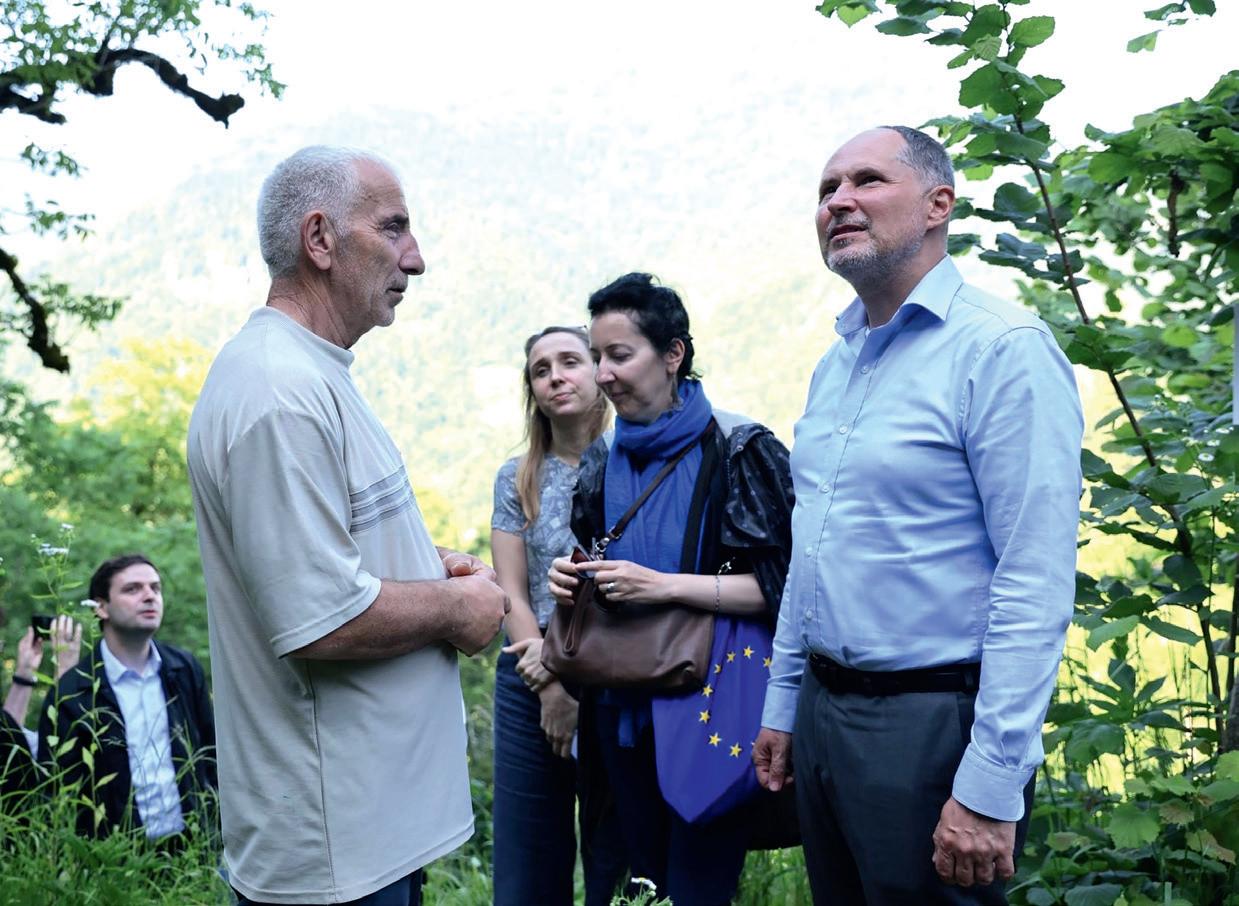
The heavy concentration of population in the capital city is one of the biggest challenges for Georgia. Nearly half of Georgia’s population lives in the capital, which houses the seat of Parliament, government, and the President, making it a major center for everything. There is a need for more balanced development across regions, and the European Union aims to support the population living in the regions. Our focus is on promoting balanced regional development, and we have been providing financial support to various activities and projects that contribute to this goal. During my visits to Mountainous Adjara, and other regions, I have met with local action groups and people who actively participate in ensuring the development of their respective regions.
Let’s discuss the development of one or maybe several regions. Could you provide examples from your country
რეგიონებს. ევროკავშირის ერთობლივი პოლიტიკა მიზნად ისახავს შეამციროს უთანასწორობა ევროკავშირის
ჩემი სამშობლო, ამის საუკეთესო მაგალითია. როდესაც პოლონეთი შეუერთდა ევროკავშირს 2004 წელს, მისი რეგიონების უმეტესობა განვითარების დონით ბევრად დაბალი იყო ევროკავშირის საშუალო მაჩვენებელზე. თუმცა, პოლონეთის წევრობის თითქმის 20 წლის განმავლობაში, რამდენიმე რეგიონის განვითარების დონემ გადააჭარბა ევროკავშირის საშუალო მაჩვენებელს.
საქართველო, გახდება რა ევროკავშირის წევრი, ამ კონცეფციით და მისი თანმხლები ფინანსური ტრანსფერებით დიდ სარგებელს მიიღებს. მიუხედავად ბოლო წლების მყარი ეკონომიკური ზრდისა, მთელი საქართველო მაინც ბევრად ღარიბია ევროკავშირის საშუალო მაჩვენებელზე. აქედან გამომდინარე, საქართველოს შეუძლია ევროკავშირისგან მნიშვნელოვანი ფინანსური ნაკადების მოლოდინი ჰქონდეს რეგიონული განვითარების მხარდასაჭერად, მაგრამ
წევრი. შეგიძლიათ გაგვიზიაროთ სტატისტიკური მონაცემები საქართველოს რეგიონულ განვითარებაში ევროკავშირის წვლილის შესახებ?
ამჟამად საქართველოს მთავრობასთან და სხვა პარტნიორებთან თანამშრომლობით
ჯეტი 54 მილიონი ევროა. ეს პროგრამა მიზნად ისახავს საქართველოს ქალაქებსა და სოფლებს შორის არსებული უთანასწორობის გადალახვას, უკეთესი საცხოვრებელი პირობებისა და ახალი შესაძლებლობების შექმნას. ჩვენ მხარი დავუჭირეთ სხვადასხვა ინიციატივას, როგორიცაა კახეთში ახალი გზების მშენებლობა, გურიაში ჩაის მარშრუტის შექმნა, რაჭაში ტურიზმის განვითარების ხელშეწყობა და იმერეთის კულტურული ძეგლების აღდგენა. ეს ინიციატივები პასუხობს ევროკავშირის პრინციპს, უზრუნველყოს, რომ ყველა რეგიონის მოსახლეობას ჰქონდეს წვდომა შესაძლებლობებსა და სერვისებზე. გარდა ამისა, სულ რამდენიმე დღის წინ, ჩვენ დავიწყეთ „Team Europe“-ის ორი ძირითადი ინიციატივის განხორციელება. ერთი ორიენტირებულია დაბალანსებულ ტერიტორიულ განვითარებაზე, ხოლო მეორე ყურადღებას ამახვილებს ჯანმრთელობასა და გარემოზე, მიზ-
or other countries you’re familiar with and share some insights on how these regions could be developed in terms of Georgia?
The concept of the European Union is about bringing countries together and uniting different regions within those countries. It is based on the notion of solidarity, where richer and more successful regions support the poorer and less developed regions. The European Union’s cohesion policy aims to reduce the disparity between the richest and poorest regions within the EU. Poland, my home country, is a prime example. When Poland joined the EU in 2004, most of its regions were far below the EU average in terms of development. However, within nearly 20 years of Polish membership, several regions have surpassed the EU average. Georgia, once a member of the European Union, would benefit tremendously from this concept and the financial transfers that accompany it. Despite the solid economic growth in recent years, all of Georgia would still be much poorer than the EU average. Therefore, Georgia can expect significant financial flows from the European Union to support regional development, but this requires Georgia’s membership in the EU.
Could you share some statistical data regarding the European Union’s contribution to Georgian development in terms of regional aspects?
Currently, we are running a large-scale program in collaboration with the Georgian government and other partners, with a budget of 54 million euros. This program aims to bridge the divide between cities and villages in Georgia, creating better living conditions and new opportunities. We have supported various initiatives such as building new roads in Kakheti, establishing the Tea route in Guria, promoting tourism development in Racha, and rebuilding cultural sites in Imereti. These initiatives align with the European Union’s principle of ensuring that people in all regions have access to opportunities and services. Additionally, just a few days ago, we launched two major “Team Europe” initiatives. One focuses on balanced territorial development, while the other emphasizes health and the environment, aiming to bridge the gap between urban and rural communities and create new opportunities for people living in the regions. These are just a few examples, but we have been supporting development in Georgia’s regions for many years, allocating approximately 200 million euros annually for initiatives supporting different sectors of Georgian society.
Among the projects implemented with the support of the European Union in Georgia and its regions, are there any that you would like to highlight for their importance or outcomes?
Every single project implemented with the support of the European Union is important and makes an impact, regardless of its size. However, let me provide you with some concrete examples. Thanks to the Association Agreement between Georgia and the EU, 8,000 European standards have already been harmonized in Georgia. We have also helped 300,000 farmers

ფანჯარა ევროპაში, ინტერვიუ
საქართველოს აეროპორტების გაერთიანების დირექტორთან, ირაკლი
ქარქაშაძესთან
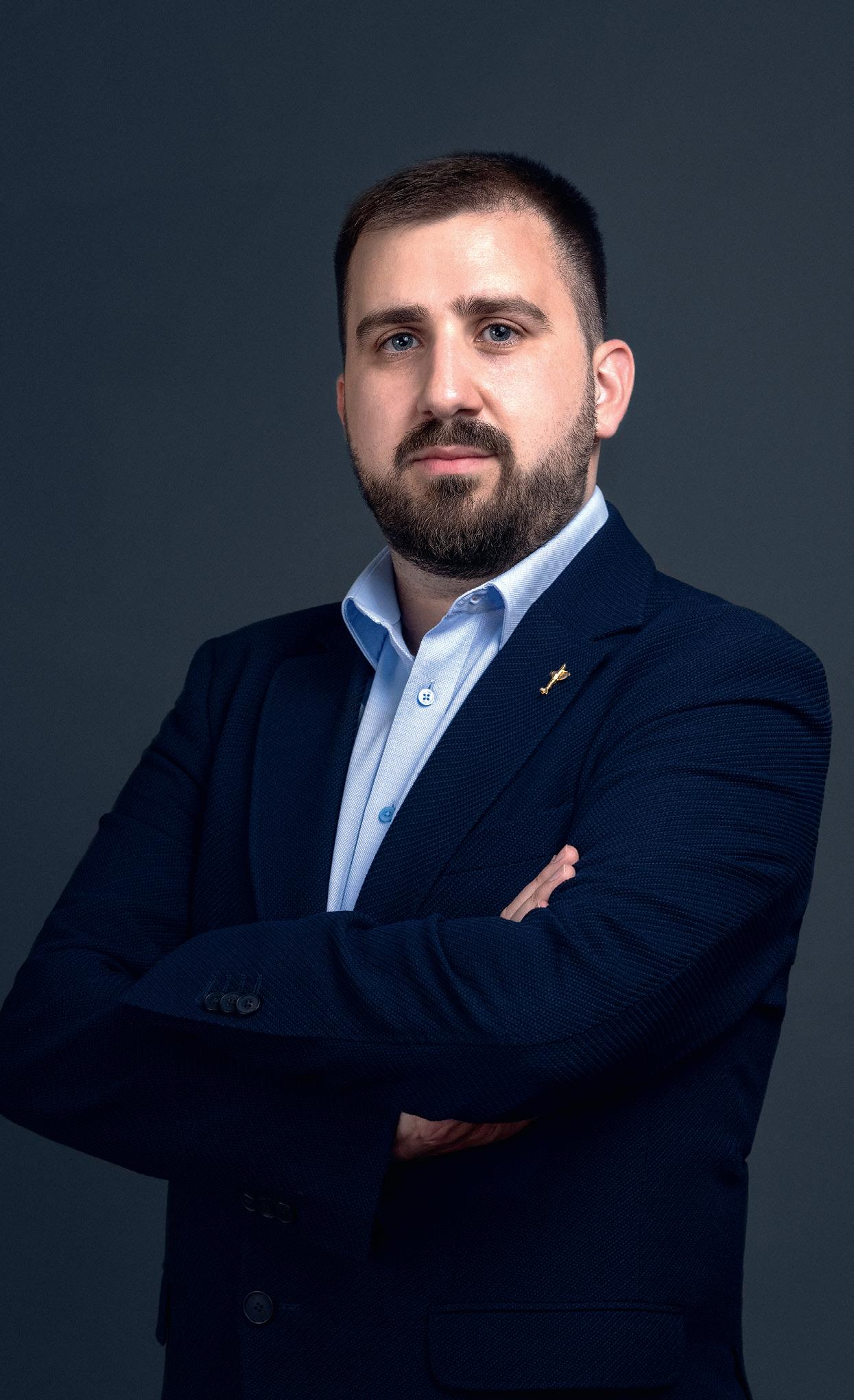
ხოლო ამ ეტაპზე მართავს ქუთაისის საერთაშორისო
აეროპორტებს. კომპანია ორიენტირებულია საქართველოს საავიაციო ინდუსტრიის, როგორც ბიზნესის განვითარებაზე. მისი მიზანია ქართული საავიაციო სექტორი კომერციულად მიმზიდველი გახადოს ადგილობრივი და უცხოური ავიაკომპანიებისა და ინვესტორებისთვის. ამ ინტერვიუში, საქართველოს აეროპორტების გაერთიანების დირექტორი ირაკლი ქარქაშაძე, საუბრობს აეროპორტების როლზე საქართველოს ეკონომიკურ განვითარებაში, მიმდინარე ინფრასტრუქტურის განვითარებაზე, მგზავრთა
he United Airports of Georgia holds ownership of all airports in the country, with the management responsibilities currently encompassing the Kutaisi International Airport, along with the local airports of Mestia and Ambrolauri. The company’s primary focus is on fostering the growth of the Georgian aviation industry as a commercially viable enterprise. Their overarching goal is to attract both local and foreign airlines and investors, thus making the Georgian aviation sector an economically appealing prospect. In this exclusive interview, Irakli Karkashadze, Director of the United Airports of Georgia, delves into the pivotal role that airports play in Georgia’s economic development. He discusses the ongoing
ქუთაისის საერთაშორისო აეროპორტი
აეროპორტს, რომელიც ქვეყანაში სიდიდით მეორე საერთაშორისო აეროპორტია და მესტიისა და ამბროლაურის ადგილობრივ აეროპორტებს. ქვეყნის ყველა აეროპორტში ვახორციელებთ საქმიანობას საავიაციო უშიშროების მიმართულებით, ასევე ზედამხედველობას ვუწევთ თბილისისა და ბათუმის საერთაშორისო აეროპორტების ოპერატორ კომპანიას.
ჩვენი როლი სცდება ტექნიკურ ფუნქციონირებას; ორიენტირებული
ვართ ქართული საავიაციო ბაზრის, როგორც კომერციულად მომგებიანი ბიზნესის განვითარებასა
ინვესტორების მოზიდვაზე. გვაქვს ამბიციური გეგმა, რომ ქუთაისის საერთაშორისო აეროპორტი გახდეს წამყვანი რეგიონის ეკონომიკაში, იყოს არამხოლოდ აეროპორტი არამედ, დიდი ეკონომიკური ფონის შემქმნელი, ჩვენი მიზანია ქუთაისის საერთაშორისო აეროპორტი ჩამოვაყალიბოთ, როგორც კარიბჭე ევროპისკენ, რაც უზრუნველყოფს საქართველოს კავშირს მსოფლიოსთან.
როგორ უწყობს ხელს საქართველოს აეროპორტების გაერთიანების მიერ მართული აეროპორტები ქვეყნის ეკონომიკურ განვითარებას? ევროკონტროლის სტატისტიკის მიხედვით, საქართველო ლიდერობს საჰაერო მიმოსვლის აღდგენით და უსწრებს ევროკავშირის წევრ ყველა ქვეყანას. საქართველოს აქვს ღია ცის პოლიტიკა 32 ქვეყანასთან და უვიზო რეჟიმი 100-მდე სახელმწიფოსთან. საერთაშორისო მგზავრთნაკადის კუთხით, ბოლო 5 წელიწადში საშუალოდ, 22 %-იანი ზრდა ფიქსირდება. 2021 წლიდან საქართველოს საერთაშორისო აეროპორტებში ოპერირება დაიწყეს ავიაკომპანიებმა 13 ახალი ევროპული და 10 ახალი აზიური მიმართულებით.საქართველოს აეროპორტების მომსახურების არეალი 12 მლნ ადამიანს ავტომობილით 6 საათიანი მგზავრობის მანძილზე მოიცავს. ჩვენი აეროპორტები გადამწყვეტ როლს ასრულებენ ქვეყნის სტრატეგიულ პარტნიორებთან
efforts to improve infrastructure, the latest trends in passenger traffic, sustainability efforts, and the challenges faced in effectively managing airports. Furthermore, he shares his visionary outlook for the future development of the industry.
Can you tell us about the role of the United Airports of Georgia in the aviation sector of Georgia?
The United Airports of Georgia owns all airports in Georgia and manages the Kutaisi International Airport, which is the second largest international airport in the country, and the local airports of Mestia and Ambrolauri. We carry out aviation security activities in all airports of the country, as well as supervise the operating company of Tbilisi and Batumi international airports. Our role goes beyond technical operation; we are focused on developing the Georgian aviation market as a commercially profitable business and attracting local and foreign companies and investors. A grand vision lies ahead for the Kutaisi International Airport, which aims to become a regional economic leader, transcending its identity as merely an airport and evolving into a catalyst for significant economic growth. The ultimate goal is to establish Kutaisi International Airport as a gateway to Europe, securing Georgia’s seamless connectivity with the world.
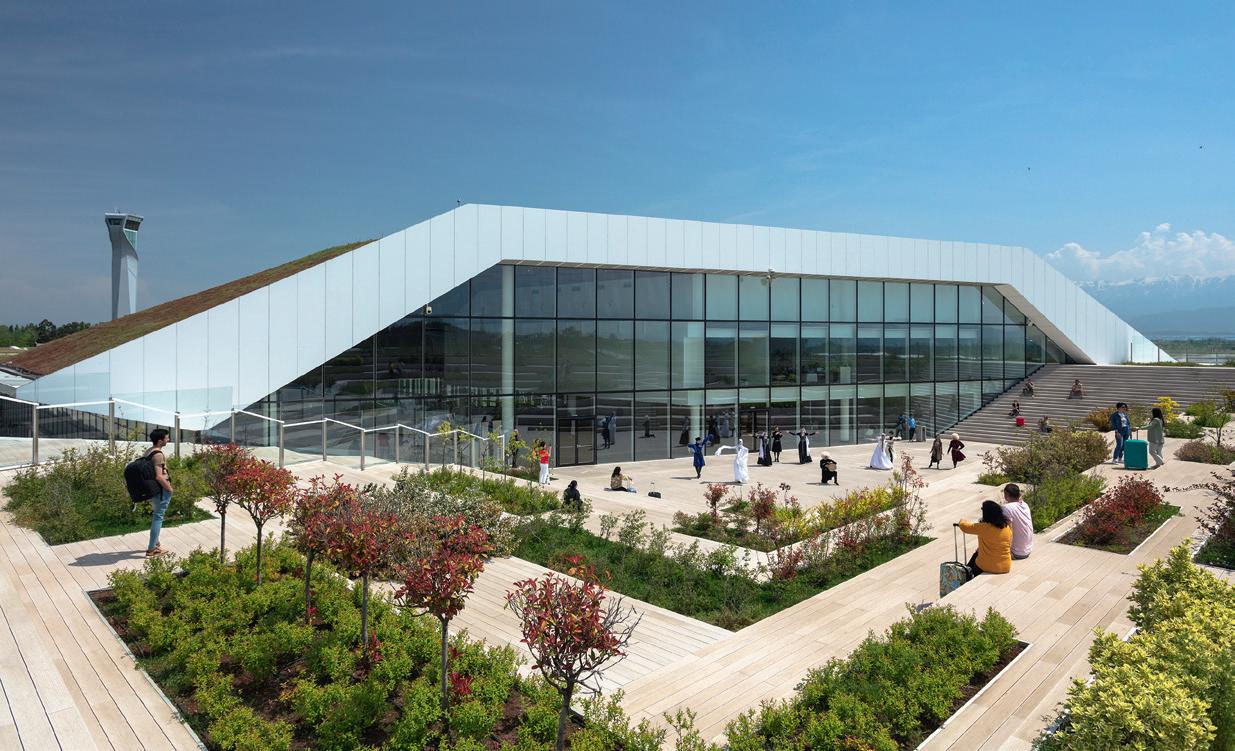
How do the airports managed by the United Airports of Georgia contribute to the country’s economic development?
According to Eurocontrol, Georgia is the leader in restoring air traffic and is ahead of all EU member states. Georgia has open skies policy with 32 countries and visa-free regime with up to 100 countries. In terms of international passenger traffic, an average growth of 22% has been recorded in the last 7 years before pandemic. Since 2021, airlines have commenced operations at the international airports of Georgia, introducing 13 new European destinations and 10 new Asian destinations to their flight schedules. The service area of the Georgian airports includes 12 million people within a 6-hour driving distance.
Our airports play a crucial role in facilitating business relations, tourism and cargo transportation with the country’s strategic partners. They also contribute to economic and social development. Local airports help stimulate domestic tourism. This is a fully government subsidized project administered by us, the United Airports of Georgia. The country’s domestic airports offer a convenient alternative to the arduous 9-10 hour drive, as flights take only about 35 to 50 minutes. In addition, the United Airports of Georgia is one of the major employers in the regions of Imereti, Svaneti and Racha. We have plans to expand the area of operation and develop more airports in other regions of the country as well.
Are there specific plans for expanding airport infrastructure to other regions?
We are in the final stages of completing the Telavi airport project. Soon, we will offer domestic flights, connecting Telavi with other regions like Batumi, Mestia, Kutaisi, and Ambrolauri. This project will contribute significantly to the development of
მილიონზე მეტ მგზავრს ველოდებით. მაქვს პატივი, შემოვიტანო ჩემი დაგროვილი გამოცდილება და ცოდნა, რათა დავეხმარო საქართველოს აეროპორტების გაერთიანებას საქართველოში ავიაციის განვითარებისთვის ჯანსაღი,
მოდით განვიხილოთ აეროპორტში მგზავრთა ნაკადის დინამიკა. შეგიძლიათ გაგვიზიაროთ ბოლო ტენდენციები ან ცვლილებები მგზავრთა მოძრაობაში?
ბოლო წლებში, ქუთაისის საერთაშორისო აეროპორტმა სწრაფი ზრდა განიცადა და დღეს, ერთ-ერთი ყველაზე სწრაფად მზარდი აეროპორტია ევროპაში. 5 წლის განმავლობაში ჩვენ შევინარჩუ
30%-ით. ACI EUROPE-ის მიერ ქუთაისის საერთაშორისო აეროპორტი დასახელებული იყო ყველაზე სწრაფად მზარდ აეროპორტად 2018 და 2019 წლებში. საუბარია იმ აეროპორტებზე, რომლებიც 5 მლნ-ზე ნაკლებ მგზავრს ემსახურებიან.
წელს, 6 თვის ჭრილში, 2019 წელთან შედარებით, მგზავრთნაკადის შთამბეჭდავი 83%-იანი ზრდა გვაქვს. ეს მეტწილად ჩვენი სტრატეგიული პარტნიორის Wizz Air-ის მიერ სამი საჰაერო ხომალდის ბაზირების დამსახურებაა, ხოლო წლის ბოლომდე მეოთხე ბაზირებული ხომალდიც დაემატება. რაც უპრეცედენტო შემთხვევაა, როდესაც ქუთაისის საერთაშორისო აეროპორტში, ერთი წლის განმავლობაში ერთდროულად ავიაკომპანიის ორი ბაზირებული ხომალდი დაიწყებს ოპერირებას. მეოთხე ბაზირებული ხომალდი ასევე, საშუალებას იძლევა ქუთაისის აეროპორტი Wizz Air-ის მცირე ბაზიდან ეტაპობრივად საშუალო ზომის ბაზად გარდაიქმნას. რაც შემდგომი სტაბილური განვითარებისა და ზრდის წინაპირობაა. მნიშვნელოვანი ზრდა აჩვენა 6 თვის ჭრილში თბილისისა და ბათუმის საერთაშორისო აეროპორტებმაც, რომლებიც ყოველწლიურად აჭარბებენ პროგნოზირებულ ციფრებს. 6 თვეში,
average, the airport has evolved into a leading tourist center in the country. It fills me with immense pride to witness the airport’s transformation, and I consider the year 2023 as a historic and record-breaking year for us. We are anticipating over a million passengers at Kutaisi airport this year.
I am honored to bring my extensive experience and knowledge to contribute to the growth of the United Airports of Georgia. My goal is to foster a robust and business-oriented environment for the advancement of aviation in Georgia.
Let’s shift focus and discuss the dynamics of airport usage. Could you share recent trends or changes in passenger traffic?
In recent years, Kutaisi International Airport has undergone a remarkable growth trajectory and has emerged as one of the fastest-growing airports in Europe. Over the course of five years, we have consistently maintained an average annual growth rate of approximately 30%. This outstanding performance led to Kutaisi International Airport being recognized as the fastest-growing airport in 2018 and 2019 by ACI EUROPE, specifically in the category of airports serving less than 5 million passengers.

This year, within a span of six months, we have witnessed an impressive 83% increase in passenger traffic compared to 2019. This remarkable growth can be attributed largely to our strategic partner, Wizz Air, basing three aircraft at Kutaisi International Airport. Furthermore, by the end of the year, we are expecting the addition of a fourth based aircraft. This is an unprecedented occurrence, as it marks the simultaneous addition of two based aircraft within a single year at Kutaisi International Airport. The introduction of the fourth based aircraft also signifies a gradual transition for the airport, evolving it from a small Wizz Air base to a medium-sized base. This transformation serves as a crucial prerequisite for further stable development and growth.
In addition to Kutaisi, the international airports of Tbilisi and Batumi have also experienced significant increases in passenger traffic within a six-month period, surpassing the forecasted numbers each year. In fact, the passenger flow in all airports
ანუ, განიხილავთ ახალი აეროპორტის აშენებას?
დიახ, ეს არის ერთ-ერთი შესაძლებლობა, რომელსაც ჩვენ ვიკვლევთ. საქართველოს მთავრობამ, ეკონომიკის სამინისტროსთან
და ჩვენთან თანამშრომლობით, შეიმუშავა წარმატებული სტრატეგია, რამაც
ინტერესი. შედეგად, მიმდინარეობს დისკუსია თბილისის საერთაშორისო აეროპორტის შემდგომი განვითარების პოტენციური მასშტაბური პროექტის შესახებ. პროექტი ჯერ კიდევ კვლევის ფაზაშია, თუმცა უახლოეს
რა გეგმები ან სტრატეგია აქვს საქართველოს აეროპორტების გაერთიანებას მგზავრებისთვის სერვისების გასაუმჯობესებლად?
ჩვენ მუდმივად ვაანალიზებთ ჩვენს აეროპორტებში არსებულ სერვისებსა და ობიექტებს, ვეძებთ გზებს მგზავრთა გამოცდილების გასაუმჯობესებლად. ჩვენ აქტიურად ვთანამშრომლობთ საერთაშორისო პარტნიორებთან და ვესწრებით საავიაციო ფორუმებს, რათა შევისწავლოთ საუკეთესო გამოცდილება და დავნერგოთ ინოვაციური პრაქტიკა. ცოტა ხნის წინ, ქუთაისის
რესტორანი, რომელიც მგზავრებს საკმაოდ მაღალ სტანდარტებს და სერვისს შესთავაზებს. ვმუშაობთ ისეთი სერვისების დანერგვაზე, როგორიცაა ავტომატური რეგისტრაცია, e-gate-ბი და VIP ლაუნჯი. ჩვენ ასევე რეგულარულად ვაახლებთ უსაფრთხოების სისტემებს, რათა უზრუნველვყოთ შემოწმებისა და ჩასხდომის პროცესი. ჩვენი ყურადღება გამახვილებულია თანამედროვე სისტემებისა და სერვისების დანერგვაზე, რომლებიც სარგებელს მოუტანს საავიაციო ინდუსტრიას.
არის თუ არა რაიმე მიმდინარე ან დაგეგმილი ინფრასტრუქტურის განვითარება ან განახლება საქართველოს აეროპორტებში?
ქუთაისის საერთაშორისო აეროპორტში მზარდი მოთხოვნის დასაკმაყოფილებლად
პროექტი მიზნად ისახავს თავდაპირველად 600-მდე პარკინგის ადგილის შექმნას, მომავალში გაფართოების შესაძლებლობით. ჩვენ ასევე ვგეგმავთ თვითმფრინავების
across the country has fully rebounded within these six months. Notably, Tbilisi International Airport alone served a staggering 1,565,760 passengers during this time frame. These promising growth trends have sparked discussions surrounding ambitious projects, including the development of a new airport in Tbilisi.
So, you are considering building a new airport?
Yes, that is one of the possibilities we are exploring. The government of Georgia, in collaboration with the Ministry of Economy, has developed a successful strategy that has fueled this growth and generated considerable interest. As a result, discussions are underway for a potential large-scale project to further develop Tbilisi International Airport. While the project is still in the research phase, we anticipate exciting announcements in the near future.
What plans or strategies does the United Airports of Georgia have to improve services and facilities for passengers?
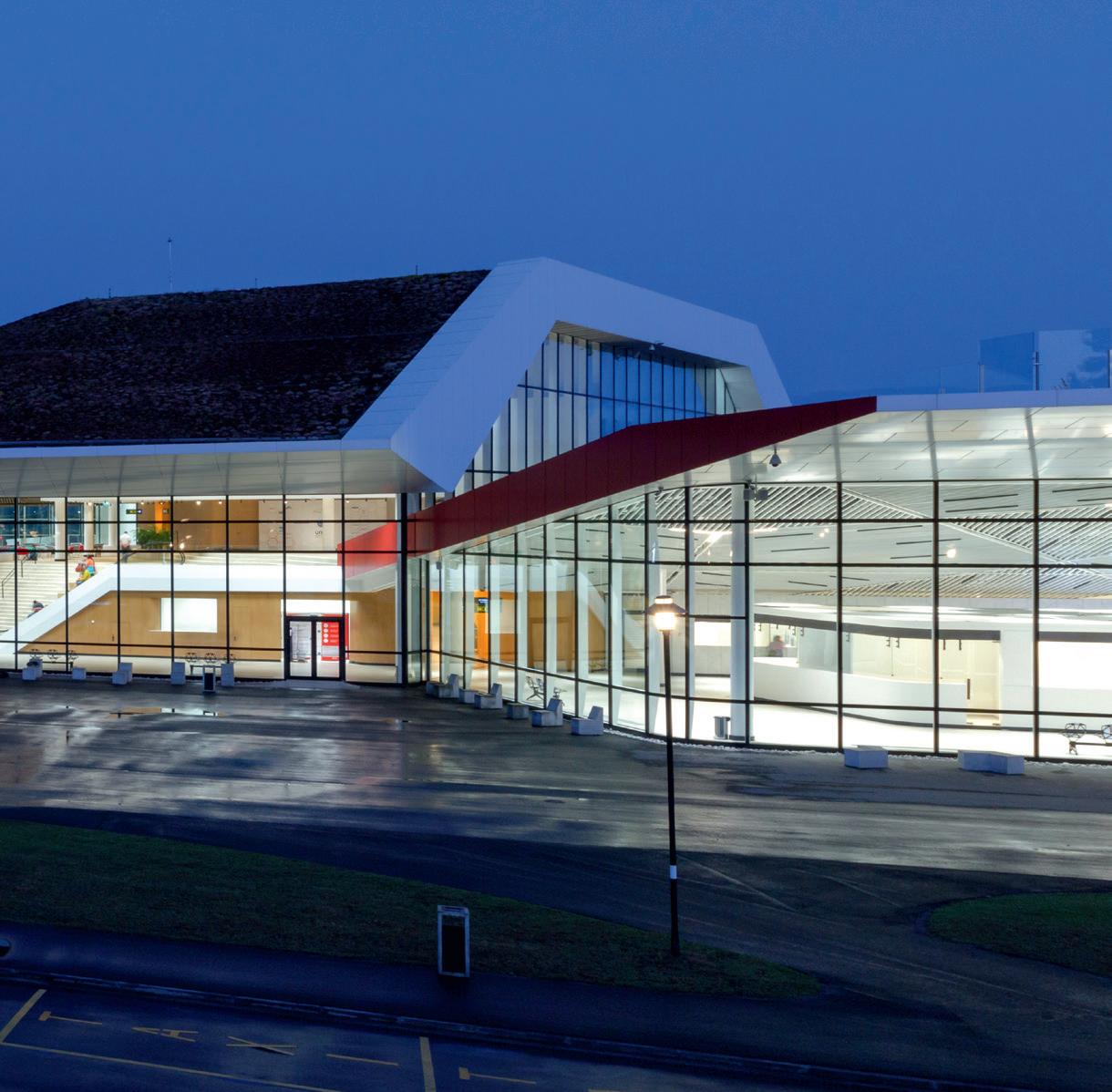
We continuously analyze the services and facilities at our airports, seeking ways to enhance the passenger experience. We actively engage with international partners and attend aviation forums to learn from their experiences and introduce innovative practices. At Kutaisi International Airport, we successfully held an auction of restaurant services, and in the near future we will have a very good Georgian restaurant in Kutaisi, which will offer quality service to passengers. We are working on introducing services like automatic registration, e-gates, and VIP lounge. We also regularly update security systems to ensure seamless check-in and boarding processes. Our focus is on implementing modern systems and services that benefit the aviation industry.
Are there any ongoing or planned infrastructure developments or upgrades at Georgia’s airports?
At Kutaisi International Airport, we have initiated the construction of a new parking space to address the increasing demand. This project aims to create up to 600 parking spaces initially, with the possibility of future expansion. We are also planning to rehabilitate aircraft stands within the airport premises and are in the process of designing a new runway. This particular project is of great significance as it will enable the development of cargo transportation, which is vital for the region. Additionally, we will soon commence work on the Masterplan for Kutaisi International Airport, ensuring its long-term development aligns with regional needs. We are also actively collaborating with air navigation services to optimize aircraft handling and enhance safety measures.
As the director of the United Airports of Georgia, what challenges do you face in effectively managing and operating airports? Additionally, could you highlight an important achievement from your career?
To address this, we collaborate closely with the Aviation University and are pleased to announce that we will Recently, we signed a memorandum with Kutaisi International University (KIU). Through this partnership, we offer paid internships to
ახალი ასაფრენი ზოლის დაპროექტება. ამ კონკრეტულ პროექტს დიდი მნიშვნელობა აქვს, რადგან ის საშუალებას მისცემს რეგიონისთვის სასიცოცხლოდ მნიშვნელოვანი ტვირთების გადაზიდვის განვითარებას. გარდა ამისა, ჩვენ მალე დავიწყებთ მუშაობას ქუ -
საერთაშორისო აეროპორტის გენერალურ გეგმაზე, რაც უზრუნველყოფს მისი გრძელვადიანი განვითარების შესაბამისობას რეგიონულ საჭიროებებთან. ჩვენ ასევე აქტიურად ვთანამშრომლობთ საქაერონავიგაციასთან, რათა მოხდეს თვითმფრინავების მართვის
და უსაფრთხოების ზომების გაძლიერება. როგორც საქართველოს აეროპორტების გაერთიანების დირექტორი, რა გამოწვევების წინაშე დგახართ აეროპორტების ეფექტიანად მართვისას და რომელია ის მიღწევა რომელსაც გამოყოფდით?
ერთ-ერთი მთავარი გამოწვევა, რომლის წინაშეც ვდგავართ, არის კვალიფიციური კადრების უზრუნველყოფა. ამის გადასაჭრელად ჩვენ მჭიდროდ ვთანამშრომლობთ საავიაციო უნივერსიტეტთან და მოხარულნი ვართ განვაცხადოთ, რომ სულ ახლახანს, გავაფორმეთ მემორანდუმი ქუთაისის საერთაშორისო უნივერსიტეტთან (KIU).
ამ პარტნიორობის საშუალებით ჩვენ სტუდენტებს ვთავაზობთ ანაზღაურებად სტაჟირებას, რაც საშუალებას გვაძლევს გავუზიაროთ გამოცდილება და გავაღვივოთ მათი ინტერესი საავიაციო პროფესიების მიმართ. ეს გვეხმარება განვავითაროთ კვალიფიციური სამუშაო ძალა, რათა შევინარჩუნოთ ინდუსტრიის შეუფერხებელი მუშაობა.
ფინანსური სტაბილურობა კიდევ ერთი მუდმივი გამოწვევაა, განსაკუთრებით ავიაკომპანიებისთვის. ჩვენ ვმუშაობთ მათი ფინანსური სიცოცხლისუნარიანობის შესანარჩუნებლად და მჯერა, რომ ამას ეფექტიანად გავუმკლავდებით. მიღწევების თვალსაზრისით, მინდა
ვნელოვანი საკითხი:ქუთაისის საერთაშორისო აეროპორტი გახდა ავიაკომპანია Wizz Air-ის ერთ-ერთი ყველაზე სწრაფად მზარდი და
students, allowing us to share our experience and cultivate their interest in the aviation profession. This helps us develop a skilled workforce to sustain the industry’s smooth operation.
Financial stability is another ongoing challenge, particularly for airlines. We work diligently to maintain their financial viability, and I believe we handle it effectively.
In terms of achievements, I would like to highlight a few significant ones: Firstly, Kutaisi International Airport has become one of the fastest-growing and largest bases for Wizz Air airline. This year alone, we added the third based aircraft on June 1st and will receive the fourth on December 1st, doubling the number of based aircraft within a year. This is an unprecedented decision by an airline, and it demonstrates the trust and success we have achieved.
Another important achievement is the development of Kutaisi International Airport as a source of pride for the region over the past decade. It’s not just about the aircraft and passenger traffic; it’s also about the highly qualified local team of 350 employees who ensure safe flights and maintain a 24/7 connection between Kutaisi and Eurasia.

Additionally, the airports in Mestia and Ambrolauri have played crucial roles in their respective regions. These airports provide vital access to mountainous regions and contribute to the tourism industry. We actively collaborate with the National Tourism Administration to make Georgia a compelling and attractive destination on the global market. We compete vigorously with leading regions, cities, and countries in Europe and beyond in terms of tourism.
How much of a priority are sustainability and environmental issues in your work?
Sustainability and environmental issues are highly important to us, considering today’s global trends. We consistently strive to make our airports more energy-efficient. Tbilisi International Airport, for instance, partially relies on solar energy to power its terminal, resulting in up to 25% reduction in electricity consumption. At Kutaisi International Airport, all available ground service



რეგიონული ზრდისა
და ეკონომიკური
ტრანსფორმაციის
გაძლიერებაინტერვიუ
აღმასრულებელ
დირექტორთან დავით
ებრალიძესთან
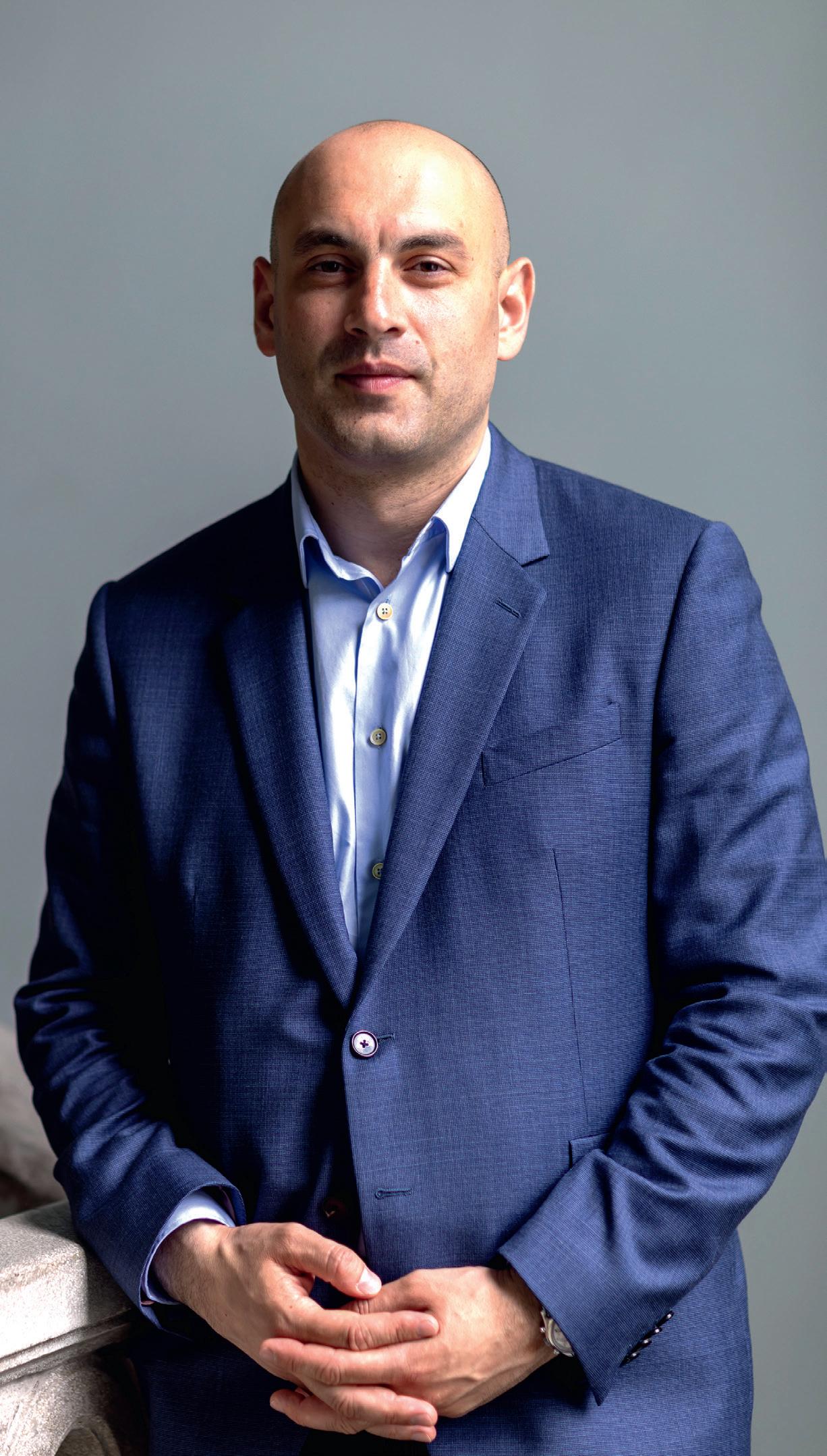
დავით ებრალიძესთან ვსაუბრობთ ფოთის თიზ-ის როლზე საქართველოს რეგიონულ განვითარებაში და მის წვლილზე რეგიონის ეკონომიკურ ტრანსფორმაციაში. დავით ებრალიძემ გაგვაცნო ადგილობრივი და საერთაშორისო ბიზნესების მოზიდვისა და მხარდასაჭერად განხორციელებული ინიციატივები, წარმატებული პარტნიორობები, თიზ-ში განვითარებული ბიზნეს სექტორები და მათი გავლენა სამუშაო ადგილების შექმნასა და რეგიონულ
როგორ შეუწყო ხელი მან რეგიონის განვითარებას
n this interview, we speak with David Ebralidze, the CEO of Poti Free Industrial Zone (FIZ), to discuss the role of Poti FIZ in the regional development of Georgia and its contributions to the economic transformation of the region. We delve into the initiatives undertaken to attract and support local and international businesses, successful partnerships benefiting the local economy, the sectors that have developed within the zone, and the impact on job creation and regional trade.
What is the role of the Poti Free Industrial Zone in the regional development of Georgia? How did it contribute to the development and economic transformation of the region?
One of the main concepts of free economic zones is the
თავისუფალი
ინდუსტრიული ზონა:
ზონის შექმნის კონცეფცია საქართველოშიც სწორედ აღნიშნულ მიზანს ემსახურებოდა. წლების განმავლობაში მოზიდული ინვესტიციებით ფოთის თიზ-ში არაერთი საწარმო ამუშავდა, შეიქმნა სამუშაო ადგილები, სადისტრიბუციო ცენტრები და ლოჯისტიკური პლატფორმა რეგიონში მოძრავი ტვირთებისთვის, რამაც ხელი შეუწყო მასთან დაკავშირებული თანმხლები ისეთი სერვისებისა და ბიზნესების განვითარებას, როგორებიც არის სატრანპორტო ბიზნესები, ტვირთის გადამუშავება, საბროკერო, თუ სხვა. თქვენი ინიციატივებიდან თუ პროექტებიდან რომელს გამოყოფდით რომელმაც განსაკუთრებით იმოქმედა ადგილობრივ საზოგადოებაზე?
ჩვენთვის ყველა პროექტი არის განსაკუთრებული და მნიშვნელოვანი. თიზ-ის ყველა ინვესტორს ვუდგებით განსაკუთრებული პასუხისმგებლობით და ვაცნობიერებთ, რომ მცირე ბიზნესიც შეიძლება განვითარდეს და გადაიქცეს მსხვილ მოთამაშედ რეგიონალურ ბაზარზე. ზოგადად, პოზიციონირებას ვახდენთ საშუალო და მცირე ბიზნესის მოზიდვაზე. დღესდღეობით ინდუსტრიულ ზონაში გვყავს კომპანიები, რომლებიც თიზ-ის დაარსების დღიდან ფუნქციონირებენ და წლიდან წლამდე ვითარდებიან, ზრდიან თავიანთ ბიზნეს საქმია-
ნობის არეალს, ტვირთბრუნვას, დასაქმებულთა რაოდენობას.
მიუხედავად ამისა, ბოლო პროექტებიდან გამოვყოფთ ფოთი ტექსტილს, ეს გახლავთ ტექსტილის ქარხანა რომელიც 2022 წლის ნოემბრიდან ფუნქციონირებს, და დღეისათვის კომპანიაში 250-მდე ადგილობრივია დასაქმებული. ქარხანაში იკერება სხვადასხვა ტიპის ტანსაცმელი საექსპორტოდ. კომპანიას დაგეგმილი აქვს მაქსიმალურად გაზარდოს წარმადობა და შესაბამისად დასაქმებულთა
development of the region in economic, social, and other directions, which implies the growth of employment, the development of other supporting businesses and services, and the development of infrastructure. The concept of creating a free industrial zone in Georgia was based on this. With the investments attracted in Poti FIZ over the years, a number of enterprises were launched, workplaces, distribution centers, and a logistics platform for moving goods in the region were created, which has helped to develop related services and businesses such as transportation, cargo handling, brokerage, and others.
Which of your initiatives or projects would you single out that particularly impacted the local community?
Every project is special and important to us. We treat all FIZ investors with special responsibility and realize that even a small business can develop and turn into a major player in the regional market. In general, we are positioning ourselves to attract medium and small businesses. Today, in the industrial zone, we have companies that have been operating since the establishment of FIZ and are developing from year to year, increasing the area of their business activities, cargo turnover, and the number of employees.
Nevertheless, among the recent projects, we will single out Poti Textile, a textile factory that has been operating since November 2022 and currently employs about 250 locals. The factory sews different types of clothes for export. The company plans to maximize productivity and, accordingly, the number of employees.
How does the Poti Free Industrial Zone attract and support both local and international businesses to invest in
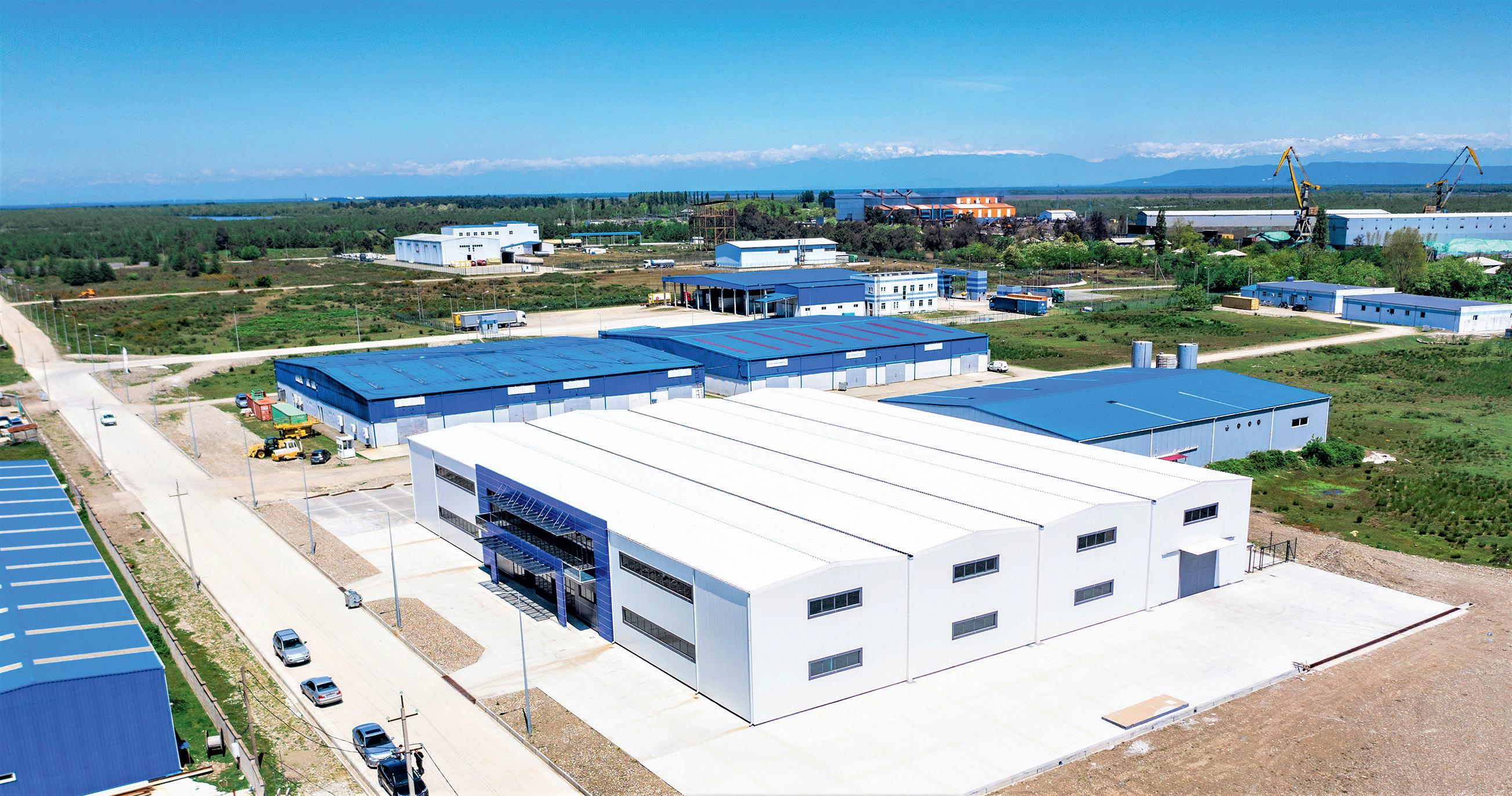
შეეძლება მსგავსი ტიპის ტვირთების მიღება/გატარება. ასევე, როდესაც ვსაუბრობთ უნიკალურობასა და ინფრასტრუქტურის განვითარებაზე, ძალიან მნიშვნელოვანია სარკინიგზო ხაზისა და ტერმინალის არსებობა ფოთის თიზ-ში, რაც ძალიან მნიშვნელოვანია რეგიონში ტვირთების მიღება/გადამუშვების თვალსაზრისით. სამუშაო ადგილების შექმნის კუთხით, როგორ იმოქმედა ფოთის თავისუფალმა ინდუსტრიულმა ზონამ რეგიონში დასაქმების მაჩვენებელზე? შეგიძლიათ მოგვაწოდოთ სტატისტიკა ან ციფრები, რომლებიც ხაზს უსვამს შექმნილი სამუშაო ადგილების რაოდენობას და ადგილობრივი სამუშაო ძალისთვის ხელმისაწვდომ შესაძლებლობებს?
კანონმდებლობა შესაძლებლობას აძლევს ინვესტორს თავისი ბიზნეს საქმიანობის შესაბამისად განსაზღვროს თანამშრომელთა რაოდენობა. აღსანიშნავია, რომ დასაქმებულთა რაოდენობა მზარდია წლიდან წლამდე. იზრდება როგორც თიზ-ში რეგსიტრირებული კომპანიების რაოდენობა, ასევე დასაქმებულთა რაოდენობაც. მაგალითად შეგვიძლია მოვიყვანოთ ისევ ტექსტილის საწარმოები სადაც ბოლო 1 წლის განმავლობაში ჯამში 300 მდე ადგილობრივი დასაქმდა. ასევე თიზ-ში ფუნქციონირებს სხვადასხვა მცირე საწარმო, სადაც ხორციელდება სხვადასხვა საყოფაცხოვრებო საქონლის (მათ შორის ტექსტილის) დაფასოვება და შეფუთვა. აღნიშნულ საწარმოებშიც ასევე დაახლოებით 100-მდე ადგილობრივია დასაქმებული. დღესდღობით ფოთის თიზ-მა 500-მდე სამუშაო ადგილი შექმნა. ფოთის თავისუფალი ინდუსტრიული ზონა მდებარეობს ძირითად სატრანსპორტო მარშრუტებთან და პორტებთან ახლოს. როგორ იმოქმედა ამ ხელსაყრელმა მდებარეობამ რეგიონალურ ვაჭრობაზე და საექსპორტო საქმიანობაზე? გაქვთ თუ არა რაიმე გეგმა ამ მდებარეობის
of enterprises taking into account various environmental regulations.
Poti Free Industrial Zone is known for its favorable business environment and infrastructure. Can you discuss the infrastructure development initiatives undertaken by your organization to improve connectivity and logistics in the region? How has this contributed to overall regional development?
Our principal function as FIZ administrators is to create infrastructure as well as its frequent development. Accordingly, depending on the demand and necessity, we try our best to develop the infrastructure to attract more diverse sectors.

An example of this is the construction of the phyto-vet laboratory, which we have completed and will be handed over to the Revenue Service/Customs Department in the near future. The mentioned infrastructure allows us to attract to FIZ such sectors that require appropriate Phyto-VET certification. It is also worth noting the fact that we are the only industrial zone in Georgia that will be able to receive/handle similar types of cargo.
Additionally, the presence of a railway line and terminal in Poti FIZ is crucial for receiving/handling cargo in the region, contributing to overall regional trade and export activities.
In terms of job creation, how has the Poti Free Industrial Zone affected the employment rate in the region? Can you provide us with statistics or figures that highlight the number of jobs created and the opportunities available to the local workforce?
The legislation allows the investor to determine the number of employees in accordance with their business activities. Both the number of companies registered in FIZ and the number of employees are increasing annually.
For example, we can cite textile enterprises where a total of 300 locals were employed during the last year. There are also various small enterprises operating in FIZ, where packing and packaging of various household goods (including textiles) are carried out, employing about 100 local employees. In total, Poti FIZ has created up to 500 jobs.
Poti Free Industrial Zone is located close to major transport routes and ports. How has this favorable location affected regional trade and export activities? Are there any plans to further leverage this location to benefit the region?
The Black Sea Corridor became a demand and safe corridor. In addition to this, the construction of the new terminal of the Port of Poti which will further increase the possibility of receiving and processing cargoes, will have a positive effect on the activities of Poti FIZ.
სტრატეგიულად მნიშვნელოვანი გეოგრაფიული მდებარეობის გამო, საქართველოს აქვს შესაძლებლობა აქტიურად ჩაერთოს მსოფლიო და რეგიონალურ ინტეგრაციულ პროცესებში. ამიტომაც სატრანსპორტო ინფრასტრუქტურის გაუმჯობესება უმნიშვნელოვანესი პირობაა ქვეყნის ეკონომიკური და სოციალური განვითარებისთვის. საქართველოს სატრანზიტო და ენერგეტიკული დერეფნის ფუნქცია კიდევ უფრო დიდ მნიშვნელობას იძენს არსებულ გეოპოლიტიკურ რეალობაში. სატრანსპორტო ინფრასტრუქტურის, როგორც რეგიონის ძირითადი სატრანზიტო კვანძის განვითარება უპირატესი მიზანია.
აქედან გამომდინარე ფოთის თავისუფალი ინდუსტრიული ზონა და ახალი ტერმინალის მშნებელობა კიდევ უფრო მეტად შეუწყობს
ათვისებას, მეტი ტვირთის მიღებას/გატარებას/გადამუშავებას, რაც თავის მხრივ აისახება რეგიონალურ ვაჭრობასა და ექსპორტის ზრდაზე.
მდგრადობა და გარემოსდაცვითი პასუხისმგებლობა ეკონომიკურ განვითარებაში სულ უფრო მნიშვნელოვანი ფაქტორებია. შეგიძლიათ გაგიზიაროთ ფოთის თავისუფალი ინდუსტრიული ზონის მიერ განხორციელებული მდგრადი პრაქტიკა ან მწვანე ინიციატივა გარემოზე ზემოქმედების მინიმიზაციის მიზნით? ფოთის თიზ მაქსიმალურად ზედმიწევნით იზიარებს გარემოსდაცვით ნორმებსა და მოთხოვნებს. თითოეული პროექტის განხილვისას, აუცილებლად ვახორციელებთ
ის რაიმე სახის ნებართვას საქართველოს გარემოს დაცვის სააგენტოდან, რათა შესაბამისად უკვე მათთან კოორდინაციაში მოხდეს ამა თუ იმ პროექტის შემუშავება, მშენებლობის პროცესი, და ექსპლუატაციაში მიღება.
Due to its strategically important geographical location, Georgia can actively engage in international and regional integration processes. That is why the improvement of the transport infrastructure is the prime condition for the economic and social development of the country. The function of the transit and energy corridor of Georgia is gaining more and more importance in the current geopolitical reality. As the main transit hub of the region, the development of transport infrastructure is a priority. Therefore, the free industrial zone of Poti and the construction of a new terminal will further contribute to the utilization of the existing logistics/transit potential, to receive/carry/process more cargo, which will affect regional trade and export growth.
Sustainability and environmental responsibility are increasingly important factors in economic development. Can you share a sustainable practice or green initiative implemented by Poti Free Industrial Zone to minimize environmental impact?
Poti FIZ complies with environmental norms and requirements as thoroughly as possible. When considering every project, we definitely carry out appropriate research to determine if it requires any kind of permission from the National Environmental Agency of Georgia. Therefore, in coordination with them, the development, construction, and commissioning of projects take place while ensuring environmental compliance.

BENEDIKT Thank you for your great wine, food and hospitality – YOUR FRIEND David”

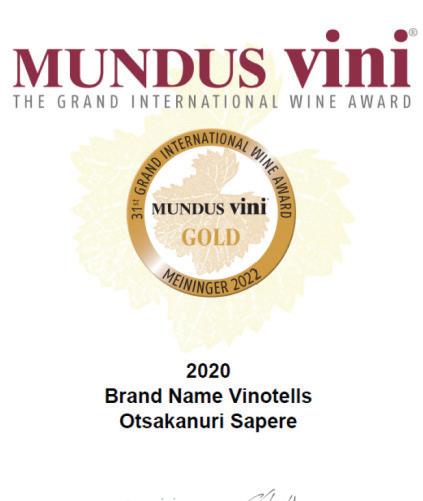



Thanks for the amazing hospitality! Food and wine were fantastic! I hope we will be back soon! Thanks again! Much love!”

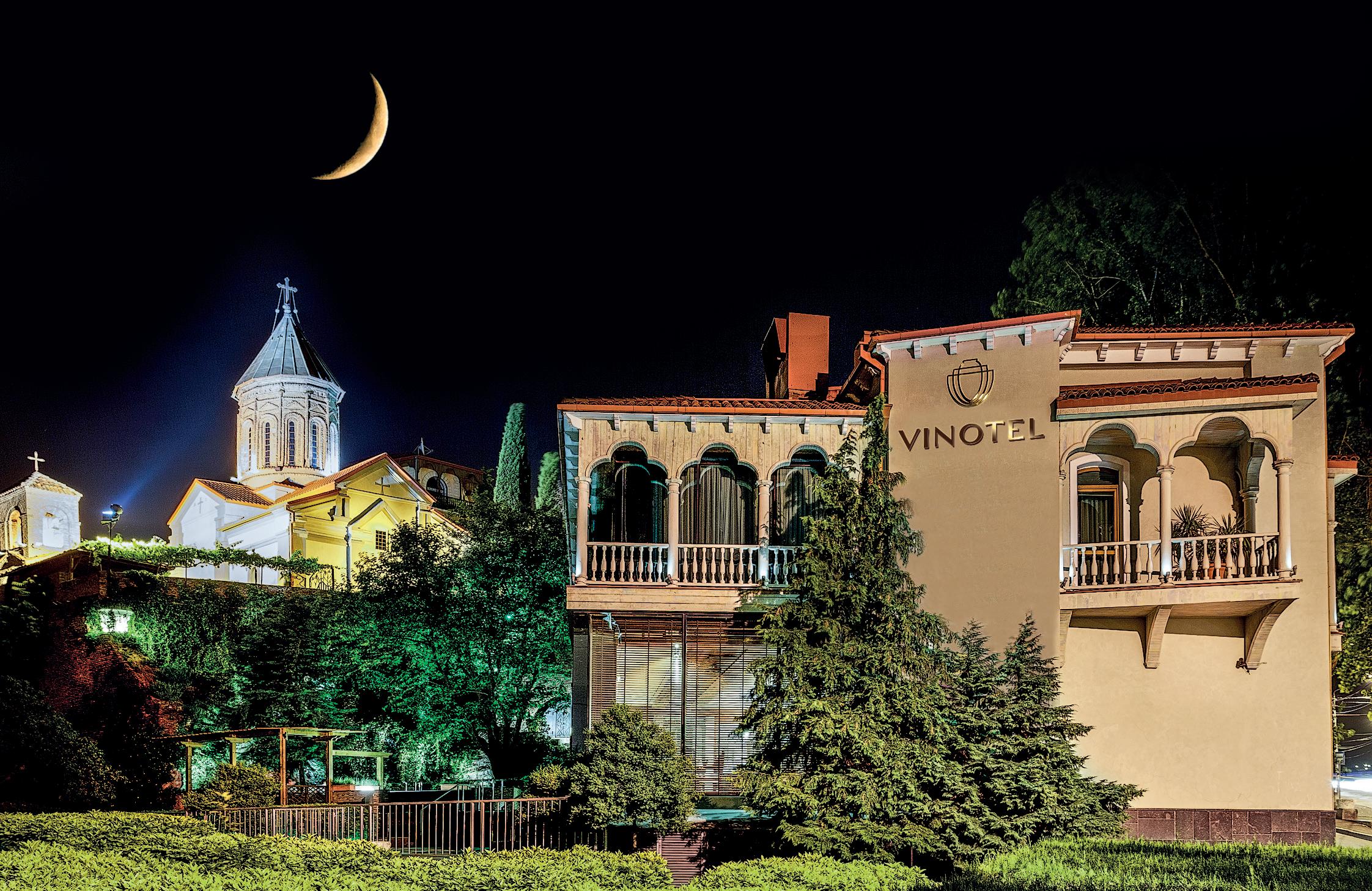
player 41

DIRK NOWITZKI, basketballTo Vinotel: Tout à fait remarquable. Tres bonnes nourriture et.... bons vins.” MICHEL PLATINI, won the Ballon d’Or 1983 - 1985 To Vinotel “Kalislea” Tibetian “Hier ist gut sein” REINHOLD MESSNER, mountaineer To: VINOTEL!!! DAVID LYNCH, Actor

ერმანია-საქართველოს თანამშრომლობა განვითარების მიმართულებითისტორია
1992 წელს გერმანია იყო პირველი ქვეყანა მსოფლიოში, რომელმაც საბჭოთა კავშირის დაშლის შემდეგ საქართველოსთან დიპლომატიური ურთიერთობა დაამყარა. საქართველო საბოლოოდ კვლავ დამოუკიდებელი გახდა, მაგრამ იმ დროისთვის ქვეყანა
წინაშე დადგა.
In 1992, Germany was the first country in the world to establish diplomatic relations with Georgia after the collapse of the Soviet Union. Georgia was finally independent again, but at the time, the country had to face severe challenges. The short civil war had devastated large sections of the city center of Tbilisi. The wars over Abkhazia and South Ossetia had displaced hundreds of thousands of people, and thousands had lost their lives. The energy supply, health system and economy had largely broken
განვითარების მიმართულებით გერმანიასაქართველოს თანამშრომლობის მრავალწლიანი ტრადიციაPeter Fischer, Ambassador of Germany to Georgia
და ეკონომიკა დიდწილად მოიშალა. ქუჩებს ანარქია მართავდა და ბევრი ადამიანი ფიქრობდა სამშობლოს დატოვებას. განვითარების მიმართულებით თანამშრომლობა თავიდანვე
იყო გერმანია-საქართველოს ურთიერთობის ერთ-ერთი მთავარი
საყრდენი. 1992 წლიდან გერმანიამ საქართველოს 1,2 მილიარდი
ევროს პირდაპირი მხარდაჭერა გამოუყო. გასულ წელს აღვნიშნეთ საქართველო-გერმანიის თანამშრომლობის 30 წელი. ამ წლებს რომ გადავხედოთ, შეგვიძლია ვთქვათ, რომ საქართველო-გერმანიის თანამშრომლობა განვითარების მიმართულებით სწორ პრიორიტეტებს შეეხო: საბჭოთა კავშირის დაშლის შემდეგ გერმანიამ მხარი დაუჭირა საქართველოს, კერძოდ, მისი სამართლებრივი და სასამართლო სისტემის რეფორმაში. სხვათა შორის, საქართველოს დღევანდელი კონსტიტუციის შემუშავებაში გერმანია იყო ჩართული. ელექტროენერგიის მიწოდება მნიშვნელოვნად გაუმჯობესდა ბოლო 20 წლის განმავლობაში და ინფრასტრუქტურაში მასიურმა ინვესტიციებმა ტექნიკური საფუძველი შექმნა ენერგიის იმპორტისა და ექსპორტისთვის. დაცული ტერიტორიების განვითარებამ და ბიომრავალფეროვნების ინტეგრირებულმა მენეჯმენტმა საქართველოს უდიდესი ეკოლოგიური აქტივების დაცვა შესაძლებელი გახადა. ჩვენ ერთად მოვახერხეთ კვალიფიციური მუშახელის დეფიციტის დაძლევა ორმაგი პროფესიული სწავლების დანერგვით მნიშვნელოვან ინდუსტრიებში, როგორიცაა მეღვინეობა, ტურიზმი და ლოჯისტიკა. ბათუმში წყლისა და კანალიზაციის სისტემების რეაბილიტირებით ჩვენ არა მხოლოდ შევძელით ხალხის საცხოვრებელი პირობების გაუმჯობესება, არამედ გავაუმჯობესეთ შავი ზღვის დაცვა და სამუშაო ადგილების შექმნა ტურიზმში. ეს შედეგები მიღწეულია სამი ათწლეულის განმავლობაში საქართველოს მთავრობასთან მჭიდრო თანამშრომლობის
ადგილზე ჩვენი ძირითადი განმახორციელებელი ორგანიზაციებისა
down. Anarchy ruled the streets, and many people were considering leaving their home country.
From the very beginning, development cooperation has been one of the main pillars of the German-Georgian relations. Since 1992, Germany has provided Georgia with a total amount of 1.2 billion Euro of direct support. Only last year, we were celebrating 30 years of bilateral Georgian-German development cooperation. Looking back, we can say that Georgian-German development cooperation has addressed the right priorities: After the disintegration of the Soviet Union, Germany supported Georgia in particular in reforming its legal and judicial system. Among others, Germany was involved in the drafting of the today’s Georgian constitution. The power supply has been improved on a major scale over the last 20 years and massive investments in infrastructure have provided a technical basis for importing and exporting energy. The development of protected areas and integrated biodiversity management have made it possible to protect Georgia’s great ecological assets. Together, we have been able to address the shortage of skilled labor by introducing dual vocational training in important industries such as wine, tourism, and logistics. By rehabilitating water and wastewater systems in Batumi, we have not just been able to enhance people’s living conditions but we have also improved the protection of the Black Sea and the creation of jobs in tourism. These results have been achieved thanks to three decades of close cooperation with the Georgian government.
The majority of these German Government funded projects has been implemented thanks to our main implementing organizations on the ground and well-known and trusted partners in
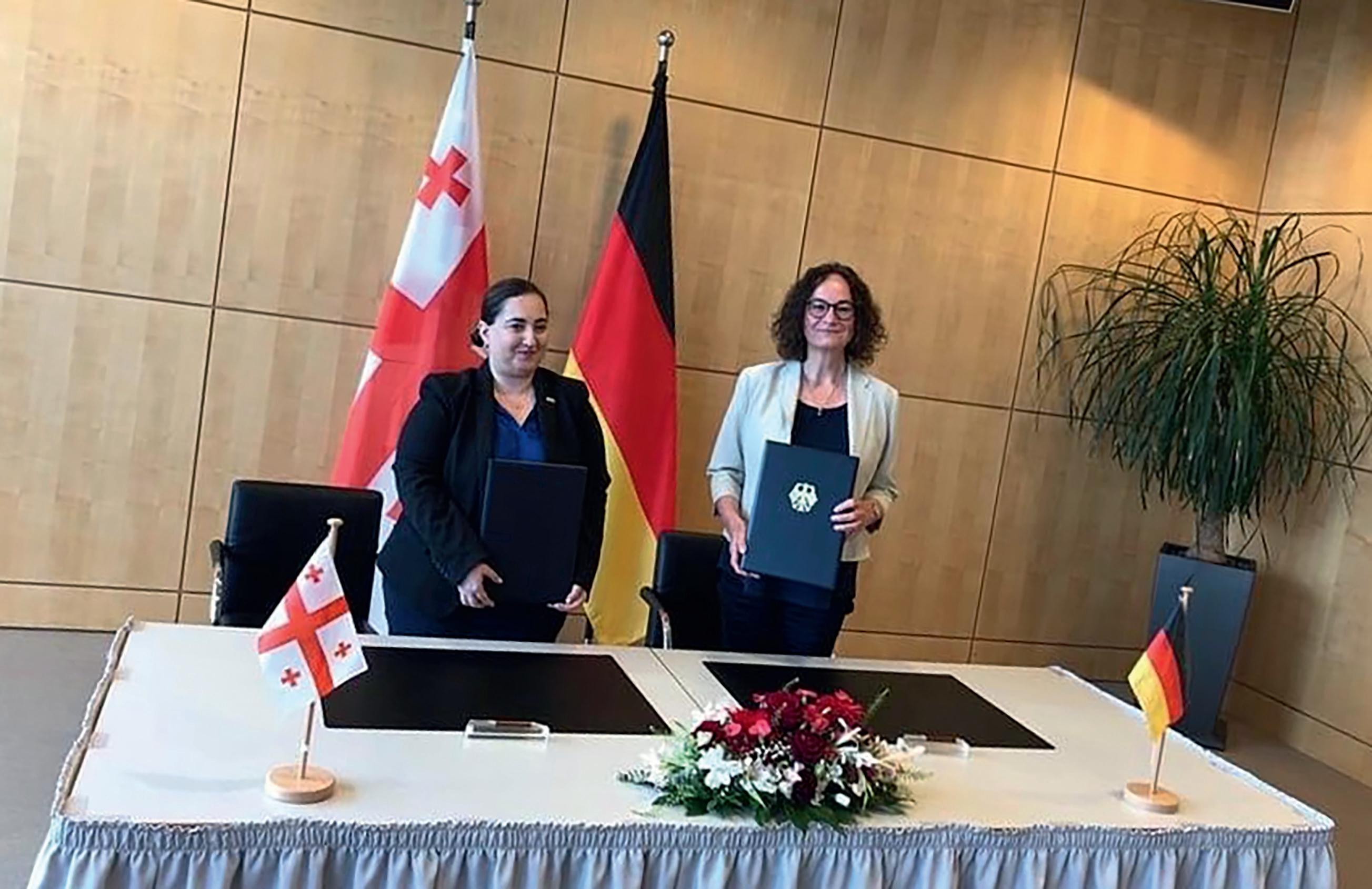
თანამშრომლობის მომავალი
გერმანია-საქართველოს მთავრობათაშორისი მოლაპარაკებების ფარგლებში, რომელიც ცოტა ხნის წინ (2023 წლის ივნისი) ბერლინში გაიმართა, 68 მილიონ ევრომდე დაფინანსების პაკეტი გამოიყო მომდევნო ორ წელში გერმანია-საქართველოს თანამშრომლობისთვის განვითარების მიმართულებით. პროექტები ფოკუსირებული იქნება წყალმომარაგებისა და ჩამდინარე წყლის სისტემის გაუმჯობესებაზე, განსაკუთრებით აჭარის ავტონომიური რესპუბლიკის ღარიბი სოფლების მოსახლეობისთვის, რეგიონული სატრანსპორტო ქსელის მოდელის შემუშავებაზე და თბილისსა და ბათუმში ურბანული მობილობის გაუმჯობესებაზე. გარდა ამისა, გერმანიის მთავრობა ცდილობს გააგრძელოს წვლილის შეტანა დასაქმების მდგომარეობის გაუმჯობესებაში შერჩეულ მზარდ სექტორებში, როგორც საჯარო, ისე კერძო სექტორთან თანამშრომლობით. კერძოდ, მინდა გამოვყო პირველი კონკრეტული საინვესტიციო პროექტი მწვანე წყალბადის ტექნოლოგიაში კავკასიის რეგიონში, რომელიც შეთანხმებული იქნა მთავრობის მოლაპარაკებების დროს. გერმანია 23 მილიონ ევროს გამოყოფს საქართველოში მწვანე წყალბადის გაფართოებისთვის. თანხები მომდევნო რამდენიმე წლის განმავლობაში გამოყენებული იქნება ელექტროლიზის ქარხნის ასაშენებლად წყალბადის შესანახი ავზით და ქარის ტურბინებით საჭირო ელექტროენერგიის წარმოებისთვის. ეს პროექტი ხელს შეუწყობს საქართველოს გახდეს მწვანე ენერგიის ჰაბი და განავითაროს მწვანე ეკონომიკა.
დაბოლოს, ამგვარად გაგრძელდება გერმანულ-ქართული პარტნიორობის მრავალწლიანი ტრადიცია განვითარების თანამშრომლობის
Within the framework of the German-Georgian intergovernmental negotiations, which took place recently (June 2023) in Berlin, a package of measures of up to 68 million Euro for the German-Georgian development cooperation was allocated for the next two years. The projects will focus on the improvement of water supply and waste water disposal particularly for the poor rural population of the Autonomous Republic of Adjara, on the development of a model for a regional transport network and the improvement of urban mobility in Tbilisi and Batumi. Furthermore, the German government seeks to continue contributing to the improvement of the employment situation in selected growing sectors by working with both the public and the private sector. In particular, I want to highlight the first concrete investment project in green hydrogen technology in the Caucasus region which was agreed during the government negotiations. Germany will provide 23 million Euro for the expansion of green hydrogen in Georgia. The funds will be used over the next few years to build, among other things, an electrolysis plant with a hydrogen storage tank and wind turbines for the necessary electricity production. This project will contribute for Georgia to become a green energy hub and develop a green economy.
To conclude, the long-standing tradition of the German-Georgian partnership in the field of development cooperation will thus be continued. With the EU perspective, we have added another dimension to the relations of the last 30 years, and Germany will continue to support Georgia on its path to a European future and on its way into the EU.

საერთაშორისო განვითარების მხარდაჭერისკენ, სიღარიბესა და უთანასწორობასთან ბრძოლის მიზნით. საქართველოში, სადაც დიდ ქალაქებსა და სოფლებს შორის დიდი ეკონომიკური და სოციალური უთანასწორობაა, საფრანგეთი თანამშრომლობს ქართულ ინსტიტუტებთან და სამოქალაქო საზოგადოების ორგანიზაციებთან, ევროკავშირის ოჯახთან, გაეროსთან და სხვა თანამოააზრეებთან, რათა ხელი შეუწყოს უფრო აყვავებულ, მდგრად და სოლიდარულ მომავალს მთელი საქართველოსთვის. საქართველოს მომავალი ევროკავშირშია და საფრანგეთი დაეხმარება საქართველოს ამ გზაზე წარმატების მიღწევაში ყველა ქართველის საკეთილდღეოდ.
განათლებაზე ხელმისაწვდომობის გაზრდა საფრანგეთი მხარს უჭერს საგანმანათლებლო პროგრამების განოხრციელებას საჯარო სკოლებში საქართველოს რეგიონებში, მაგალითად, იმერეთში, სამეგრელო-ზემო სვანეთსა და კახეთში, ფრანგულის გაკვეთილებით უზრუნველყოფის გზით. მასწავლებელთა პროფესიული განვითარების

rance devotes 0.56% of its gross national income to international development aid, with the aim of combating poverty and inequalities on any ground. In Georgia, where economic and social disparities between big cities and rural areas are significant, France is partnering with Georgian institutions and civil society organisations, EU familly, UN as well as other likeminded to contribute to a more prosperous, sustainable and solidary future for all of Georgia. Georgia’s future is in the EU and France will help Georgia succeed on this path for the benefit of all Georgians.
France supports education programs in the regions of Georgia through provision of French classes in public schools, for example in Imereti, Samegrelo-Zemo Svaneti, and Kakheti. With the National Centre for Teacher Professional Development, France facilitates in-service training for 32 French teachers throughout Georgia and offer technical expertise to 23 schools to help them with the recruitment of French teachers. We also supported the setting up of an after-school program in Duisi aimed at improving opportunities for young people in the Pankisi Valley to access
საფრანგეთის წვლილი
საქართველოს რეგიონულ განვითარებაშიSheraz Gasri, Ambassador of France to Georgia
განვითარების
გაძლიერება:
ისრაელის ელჩი
საქართველოს
რეგიონებში ისრაელის
მხარდაჭერით

განხორციელებული
პროექტების შესახებ
მიმართულებით. განიხილავს ისრაელის განვითარების თანამშრომლობის სტრუქტურასა და საქმიანობას საქართველოში, რომელიც ფოკუსირებულია სოფლის მეურნეობის სფეროში ცოდნის გაცვლისა და ტექნოლოგიების ინიციატივებზე. ის ასევე საუბრობს თანამშრომლობის პრიორიტეტებზე, მიღწევებსა და სამომავლო მიმართულებებზე, რომლებიც აყალიბებს მუდმივ კავშირს ისრაელსა და საქართველოს შორის.
უკვე წელიწადზე მეტია, რაც საქართველოში ისრაელის ელჩი ხართ. ჯერ კიდევ მაშინ, როდესაც გაიგეთ, რომ გახდებოდით ისრაელის ელჩი საქართველოში. როგორი შთაბეჭდილება გქონდათ ამ ქვეყანაზე? რამდენად გამართლდა ისინი ამ პერიოდში? როცა გავიგე, რომ საქართველოში ისრაელის შემდეგი ელჩი გავხდებოდი, ძალიან გამიხარდა. მანამდე ჩემი ცოდნა
n this insightful interview, we have the privilege of speaking with the Ambassador of Israel to Georgia HadasMeitzad, who sheds light on the deepening bilateral relations and development cooperation between the two nations. We also delve into the Israeli Development Cooperation’s structure and activities in Georgia, focusing on agricultural knowledge exchange and technology initiatives. The Ambassador shares valuable perspectives on the priorities, achievements, and future directions that shape the enduring bond between Israel and Georgia.
It’s been more than a year that you are an ambassador of Israel in Georgia. Let’s go back to the point when you found out that you would become an ambassador of Israel in Georgia. What was your impression about Georgia before you arrived? Have you been to this country before, or was it your first time? How did your impressions match up with the reality during this period?
When I found out that I would become the next Ambassador
ნეობის მეთოდოლოგიებსა და ტექნოლოგიებში მოწინავე ტრენინგებისთვის.
ერთკვირიანი სასწავლო პროგრამა წარმატებით ჩატარდა და მონაწილეები ცოტა ხნის წინ დაბრუნდნენ თავიანთ რეგიონებში. მოხარული ვარ ამ შესაძლებლობით, რადგან მან მონაწილეებს არა მხოლოდ ახალი ტექნოლოგიებისა და მეთოდოლოგიების გაცნობის შესაძლებლობა მისცა, რომლებიც
არამედ ხელი შეუწყო რეგიონებს შორის ნდობის აღდგენის ღონისძიებების კონცეფციას. ეს ინიციატივა ემსახურება
არა მხოლოდ სოფლის მეურნეობის საჭიროებებს, არამედ ეროვნულ ინტერესებსაც.
ეს მხოლოდ ერთი მაგალითია MASHAV-ისა და საქართველოში ისრაელის საელჩოში მიმდინარე მრავალი საქმიანობისა. ჩვენ ასევე გვაქვს MASHAV-ის საგრანტო პროგრამა, სადაც მონაწილეებს საქართველოში დაბრუნების შემდეგ შეუძლიათ განაცხადი გააკე-
უჭერს პროექტებს ან კვლევებს, იმ მიმართულებით რაც მათ შეისწავლეს ისრაელში. მაგალითად, ერთმა მონაწილემ, პროფესორმა ნინო მიქავამ, ჩაატარა კვლევა ისრაელში შემუშავებულ ტელემედიცინის მოწყობილობაზე. მისი კვლევა მიზნად ისახავდა გამოეკვლია, თუ როგორ შეუძლია ამ მოწყობილობას დაეხმაროს ხანშიშესულ ადამიანებს შორეულ რეგიონებში, რომლებსაც არ აქვთ წვდომა მოწინავე სამედიცინო დახმარებაზე. მისი კვლევის მეშვეობით, ის იმედოვნებს, რომ იპოვის სწორ პარტნიორს საქართველოში ამ ტექნოლოგიის დანერგვისა და ჯანდაცვის ხელმისაწვდომობის გასაუმჯობესებლად.
გარდა მსგავსი ინიციატივებისა, კიდევ ბევრი მნიშვნელოვანი პროექტი გვაქვს დაგეგმილი. მაგალითად, აგვისტოში სოფლის მეურნეობის სამინისტროსთან და სამეცნიერო კვლევების ცენტრთან ერთად გავხსნით ჰიდროპონიურ სათბურს. ეს სათბური იქნება სადემონსტრაციო ადგილი, სადაც ფერმერები, სოფლის მეურნეობის ექსპერტები და ექსტენციის მუშაკები გაივლიან ტრენინგს ჰიდროპო-
to Israel for advanced training in agriculture methodologies and technologies.
The one-week training program was successfully conducted, and the participants recently returned to their region. I am delighted about this opportunity as it not only provided them with exposure to new technologies and methodologies that they can now implement in their region but also contributed to the concept of Confidence Building Measures between the regions. This initiative serves not only agricultural needs but also serves national interests.
This is just one example of the many ongoing activities at MASHAV and the Israeli Embassy to Georgia. We also have MASHAV grant program in place where participants can apply for grants of up to $10,000 upon their return to Georgia. These grants support projects or research related to what they studied in Israel. For instance, one participant, Professor Nino Mikava, conducted research on a telemedicine device developed in Israel. Her study aimed to explore how this device could assist isolated elderly individuals in remote regions who lack access to advanced medical care. Through her research, she hopes to find the right partner in Georgia to implement this technology and improve healthcare accessibility.
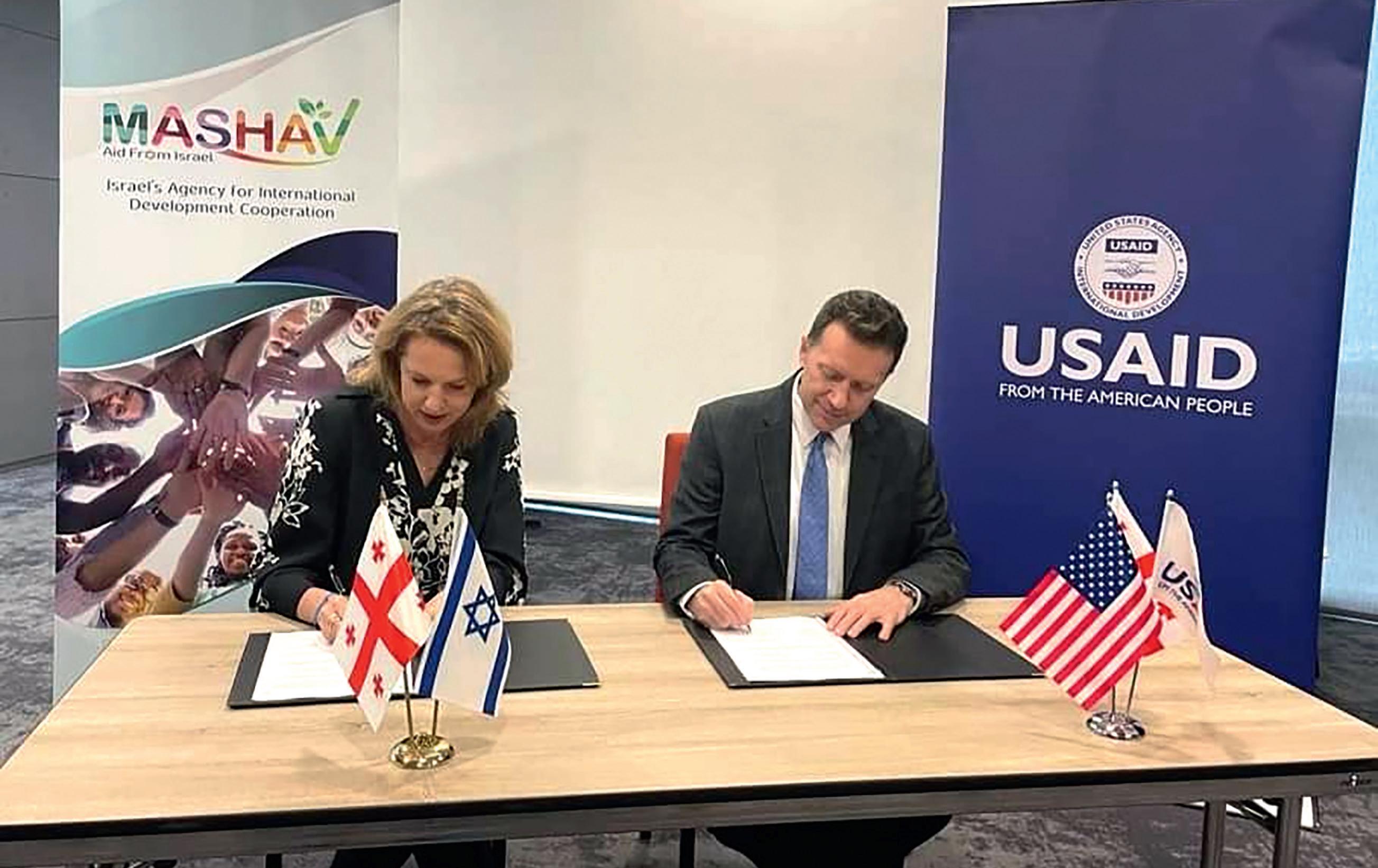
In addition to such initiatives, we have significant projects planned. For instance, in August, we will be opening a hydroponic greenhouse in collaboration with the Ministry of Agriculture and the Center for Scientific Research. This greenhouse will serve as a demonstration site, where farmers, agricultural experts, and extension workers will receive training in hydroponic agriculture. The knowledge gained will then be disseminated throughout the region, fostering sustainable development.
Another example is the development of smart irrigation tech-
სხვადასხვა რეგიონში, დაინახა მათი უნიკალური მახასიათებლები, განვითარების პერსპექტივები, გამოწვევები და პოტენციალი. ადგილობრივი
მხარდაჭერიდან დაწყებული კულტურული გაცვლის
საზოგადოებასთან. და ვინაიდან მისი მისია დასასრულს უახლოვდება, ეს შემაჯამებელი
n this interview, we sit down with Ambassador Maaike van Koldam, the Ambassador of the Netherlands to Georgia. During her time in Georgia, she embarked on journeys to various regions, witnessing their unique characteristics, development prospects, challenges, and potential. From supporting local initiatives to fostering cultural exchanges and promoting women’s rights, Ambassador van Koldam sheds light on the Embassy’s endeavors to strengthen ties with Georgian civil society. As her mission nears its end, she reflects on the country’s progress, resilience, and its aspiration for closer integration with the European Union.

ელჩი მააიკე ვან კოლდამი
საქართველოს რეგიონების განვითარებაზე, გამოწვევებსა და
ნიდერლანდების მხარდაჭერაზე
მდგრადობასა და მის მისწრაფებას ევროკავშირთან უფრო მჭიდრო ინტეგრაციისკენ.
საქართველოში მისიის დროს თქვენ ეწვიეთ რამდენიმე რეგიონს. როგორია თქვენი შთაბეჭდილებები რეგიონებზე, მათ განვითარებაზე, გამოწვევებზე და პოტენციალზე?
მართალი ხართ, მე მოვინახულე რამდენიმე რეგიონი და თითოეულმა ამ მოგზაურობამ დაუვიწყარი შთაბეჭდილება დატოვა ჩემზე. როგორც ელჩი, დროის უმეტეს ნაწილს ვატარებ დედაქალაქში, სადაც შემიძლია დავუკავშირდე ჩემს კოლეგებს - მთავრობას, პარლამენტს, ჩემს უშუალო კოლეგებს - სხვა ელჩებს. თბილისი ის ადგილია, სადაც მუდმივად ყველაფერი ხდება – წამყვანი არასამთავრობო ორგანიზაციები ატარებენ ღონისძიებებს, ბიზნესმენები მეპატიჟებიან სხვადასხვა შეხვედრებზე; და, ბუნებრივია, ჰააგაში, საგარეო საქმეთა
During your mission in Georgia, you visited several regions. What are your impressions of the regions, their development, challenges, and potential?
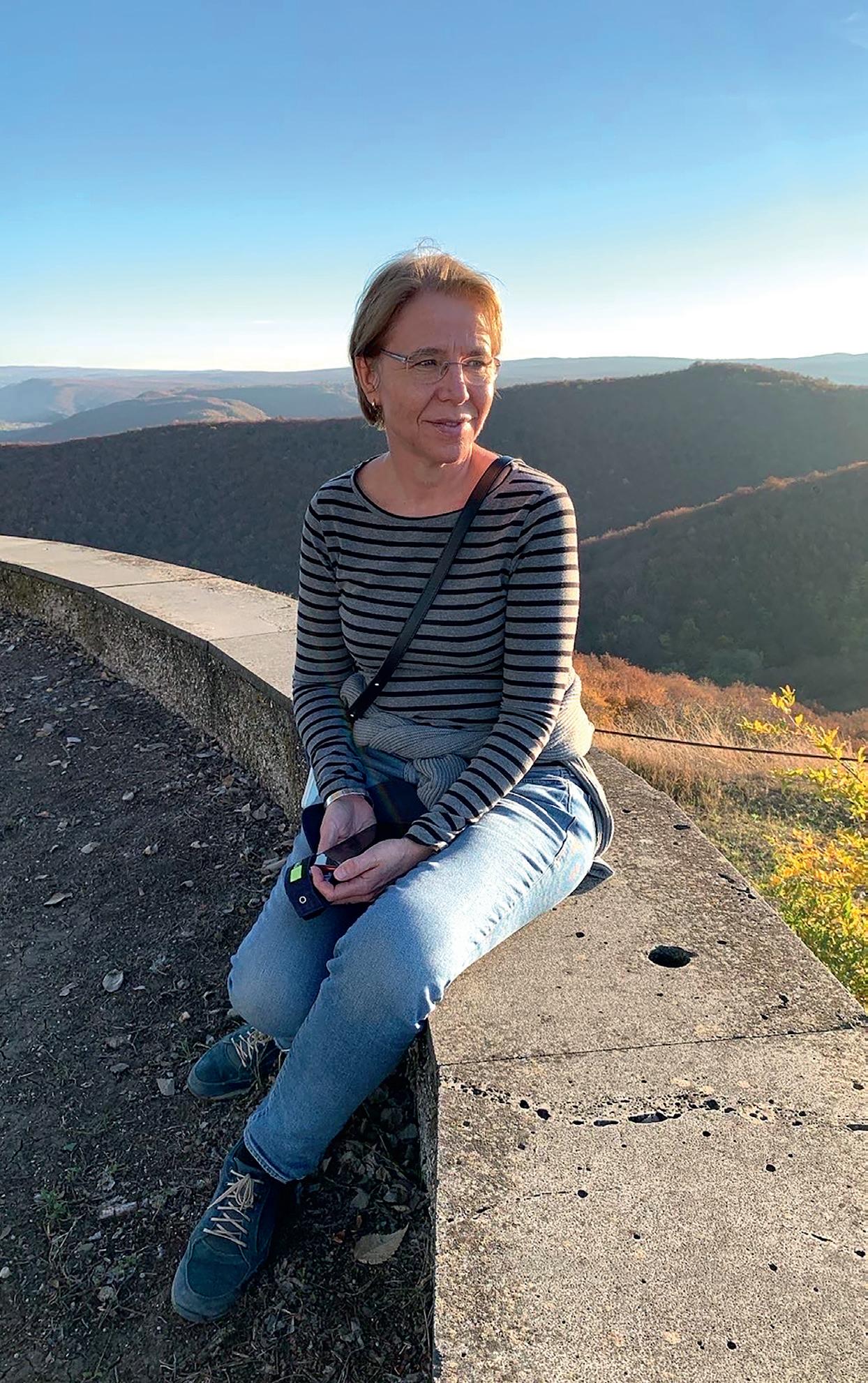
You are right, I did visit some regions and each and every of these trips has left an unforgettable impression on me. As an ambassador I spend most of the time in the capital, where I can connect with my immediate counterparts – government, Parliament, my colleagues – other ambassadors. Tbilisi is the place where everything is happening all the time – leading NGO’s hold their events, business people invite me for different functions; and, naturally, as I am constantly in contact with the Ministry of Foreign Affairs in The Hague, quite a lot of my working time is spent behind my desk and my computer in the office or in the residence. However, I think that in order to learn the country better, it is essential to visit regions, be outside Tbilisi as well, talk to people beyond the immediate network. I have visited most of the Georgian regions – there may still be a couple I missed (after all, two years of my posting fell on Covid and the lockdown); but it is always good to have something to come back to in the future.
Every region is different but what they all have in common is great Georgian food with regional influences, beautiful nature, great hospitality and, most importantly, many hard-working, talented women and men. Life in the regions may sometimes be harder than in Tbilisi – fewer jobs make many people move to Tbilisi – or even take up jobs in Europe, leaving their beautiful town or village behind. But I very much hope they will be able to come back.
What do you see as the development potential for these regions, and what challenges do they face?
Most regions see their development potential in tourism and agriculture, and fortunately, there are many initiatives supported by the international community that help local guest house owners or farmers strengthen and improve their businesses. For the Netherlands, our focus is on agriculture.
Development potential is certainly there. Some challenges can be in infrastructure and education, particularly in vocational training. Additionally, a well-developed rule of law remains essential for a good investment climate, including an independent judiciary and protection of vulnerable groups in society. These are areas where our embassy is eager to team up with our Georgian counterparts, with our official counterparts and with the vibrant and strong civil society.
Can you share specific experiences or highlights from your visits to the regions?
I am tempted to give you the name of the region that is on top of my list, but I think that would be unfair to the rest, as everywhere I go, I am met with respect and hospitality, amazing personal stories, and commitment to local communities. Some recent highlights have been the wooden mosques in Upper Adjara, meeting the women who take care of cattle and produce
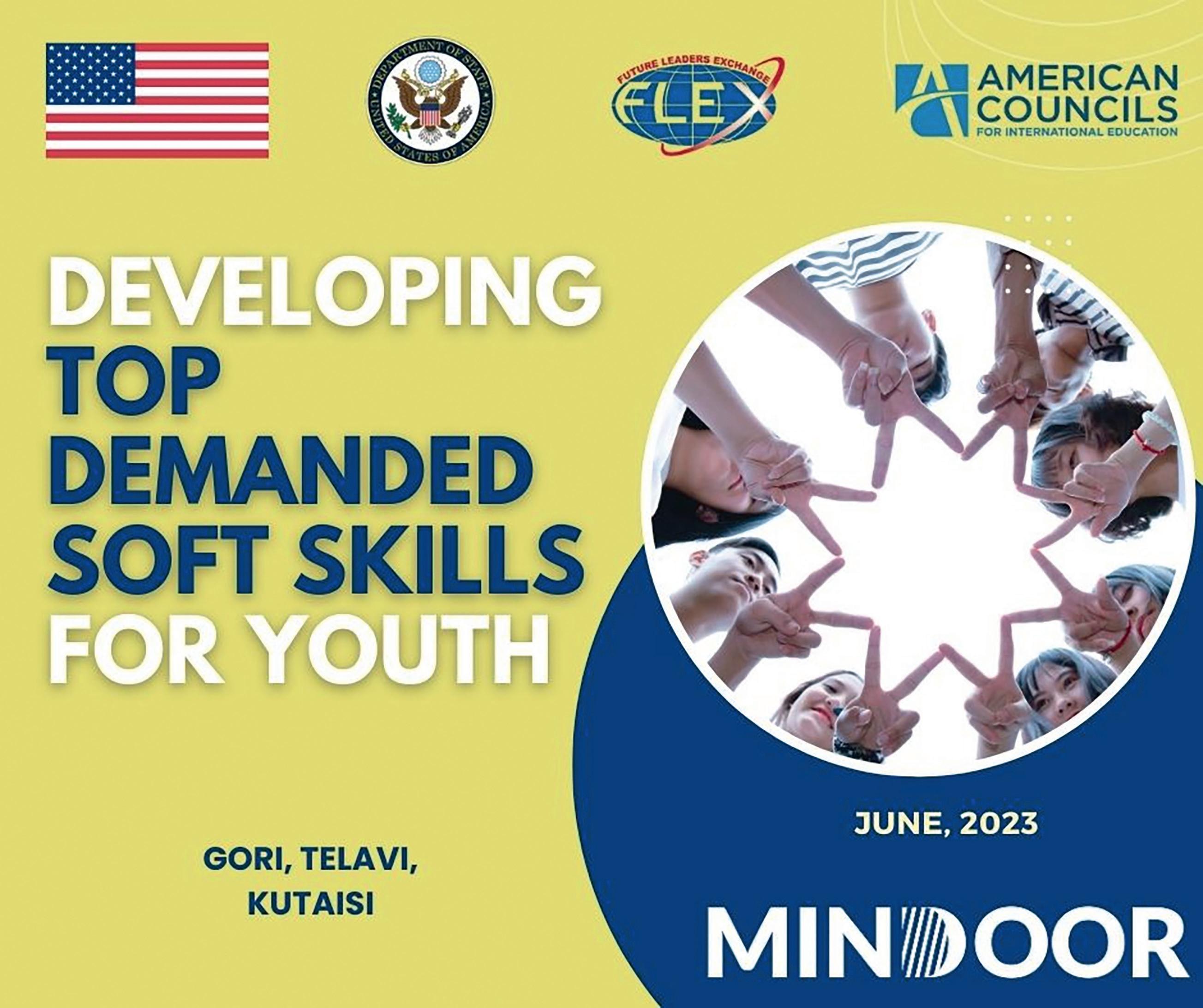
ლანა ჩხარტიშვილთან
და MinDoor-ის დამფუძნებელთან და მმართველ პარტნიორთან ნინო ბერუაშვილთან. ახლადდაარსებულმა ორგანიზაციამ, MinDoor-მა უკვე წამოიწყო გავლენიანი პროექტები რეგიონებში, რომლებიც ორიენტირებულია ხარისხიანი განათლების ხელმისაწვდომობაზე და დასაქმების ხელშეწყობაზე საჯარო-კერძო პარტნიორობით. განვიხილავთ მათ მისიას, მიმდინარე ინიციატივებსა და სამომავლო გეგმებს და ვსაუბრობთ მათი საქმიანობის მნიშვნელობაზე ახალგაზრდების გაძლიერებისა და სოციალურ-ეკონომიკური განვითარების ხელშეწყობაში.
სულ რამდენიმე თვეა, რაც „მინდორი“ დაფუძნდა და უკვე აქტიურად ატარებთ პროექტებს რეგიონებში. პირველ რიგში რომ გვითხრათ, რატომ არის რეგიონები „მინდორისთვის“ პრიორიტეტული და რა მნიშვნელობა აქვს იქ თქვენს სხვადასხვა აქტივობას?
რეგიონებში პროექტების განხორციელება სრულად ეხმიანება ჩვენს ძირითად მისიას: ჩვენი ძირითადი დანიშნულებაა, სხვადასხვა ჯგუფისთვის უფრო მეტად ხელმისაწვდომი გავხადოთ ხარისხიანი განათლება და ხელი შევუწყოთ მათ დასაქმებას საჯარო-კერძო პარტნიორობის გზით. როდესაც ჩვენი საგანმანათლებლო პროგრამა რეგიონში ხორციელდება, ეს ეხმარება ახალგაზრდებს, გაიღრმავონ ცოდნა, გაიუმჯობესონ კომპეტენცია და უნარები, რაც მნიშვნელოვა-
n this interview, we have the opportunity to hear from Lana Chkhartishvili, the Founder and CEO of MinDoor, and Nino Beruashvili, the Founder and Managing Partner of MinDoor. As a recently established organization, MinDoor has already embarked on impactful projects in the regions, focusing on making quality education accessible and promoting employment through public-private partnerships. We delve into their mission, current initiatives, and future plans, shedding light on the importance of their activities in empowering the youth and fostering socio-economic development.

It’s been just a few months since MinDoor was established and you are already actively conducting projects in the regions. First of all, could you tell us why the regions are a priority for MinDoor and what is the importance of your various activities there?
Implementation of projects in the regions fully corresponds to our main mission: our main purpose is to make quality education more accessible to different groups and to promote their employment through public-private partnership. When our educational program is implemented in the region, it helps young people to deepen their knowledge, improve their competence and skills, which are important for both their personal and society’s development in general. This helps them in productive employment in the future, which contributes to the economic activity of the
ეხმარებათ პროდუქტიულად დასაქმებაში, რაც ხელს უწყობს რეგიონების ეკონომიკურ აქტივობას; რომელიც ჩვენს რეგიონებს განსაკუთრებით ესაჭიროებათ.
რა პროექტები განახორციელეთ რეგიონებში, რომელ რეგიონებში და რა შედეგით დასრულდა?
ჩვენი ერთ-ერთი მიმართულება ახალგაზრდებისთვის იმ ეგრეთ წოდებული „რბილი უნარების“ გამომუშავებაა, რომლებიც შრომით ბაზარზეა ამჟამად მოთხოვნადი და სამომავლოდ კიდევ უფრო მოთხოვნადი
უნარების გამომუშავებას უკავშირდება, და ის ხორციელდება თელავის, გორისა და ქუთაისის უნივერსიტეტის სტუდენტებისთვის. ტრენინგს, პროექტის ფარგლებში, 150 სტუდენტი გაივლის.
პროექტი ჯერ მიმდინარეა და შედეგზე საუბარი ნაადრევია, თუმცა, არ შეგვიძლია, ხაზი არ გავუსვათ მონაწილეების პოზიტიურ, ანონიმურ უკუკავშირს ტრენინგის დასასრულს. ჩვენ ასევე ვგეგმავთ, რომ 6 თვის გასვლის შემდეგ შევაფასოთ პროექტის შედეგი და დიდი იმედი გვაქვს, რომ „დიპლომატის“ შემდგომ ნომრებში კვლავ გვექნება ამაზე საუბრის შესაძლებლობა. თუ იყო რამე ისეთი, რამაც თქვენი გაკვირვება გამოიწვია ან უფრო სხვანაირად დაგაფიქრათ თქვენი პროექტების საჭიროებაზე?
ჩვენთვის განსაკუთრებით სასიამოვნოდ გასაოცარი იყო მოტივაციის ის დონე და ენთუზიაზმი, რომლითაც ახალგაზრდები პროექტში ერთვებიან. ჩვენი მოლოდინი იყო, რომ მოტივაციის დონე მათი მხრიდან მაღალი იქნებოდა, თუმცა, რაც ადგილზე დაგვხვდა, მან ცალსახად გადააჭარბა მოლოდინს. სტუდენტების ჩართულობა,
regions; which our regions especially need.
What projects have you implemented in the regions, in which regions, and with what results?
One of our directions is to develop the so-called “soft skills” for young people, which are currently in demand in the labor market and will become even more in demand in the future. Our current project is also related to developing these skills, and it is implemented for students of Telavi, Gori, and Kutaisi universities. 150 students will undergo training within the project.

The project is still ongoing, and it is too early to talk about the results. However, we cannot but emphasize the positive, anonymous feedback of the participants at the end of the training. We also plan to evaluate the results of the project after 6 months, and we really hope that we will have the opportunity to talk about it again in the next issues of Diplomat.
Was there anything that surprised you or made you think differently about the need for your projects?
We were especially pleasantly surprised by the level of motivation and enthusiasm with which young people are involved in the project. Our expectation was that the level of motivation on their part would be high; however, what we found on the ground exceeded our expectations. The involvement of students, their desire to achieve an important goal and make a valuable contribution to the development of society is very high, which makes us especially happy and makes us want to implement many more interesting projects for the regions.
There is a lot of talk about how talented people live in the regions. Did you meet someone there who impressed you?
განვითარებაში, ძალიან მაღალია, რაც ჩვენ განსაკუთრებით გვახარებს და სურვილს გვიჩენს, რომ კიდევ არაერთი საინტერესო პროექტი განვახორციელოთ რეგიონებისთვის.
ბევრს საუბრობენ, თუ რამდენად ნიჭიერი ადამიანები ცხოვრობენ რეგიონებში. თქვენ თუ გაიცანით იქ ვინმე ისეთი, რომელმაც თქვენი აღფრთოვანება გამოიწვია?
თითოეული მონაწილე ჩვენთვის განსაკუთრებით დასამახსოვრებელი აღმოჩნდა თავისი მკვეთრად გამოხატული ინდივიდუალურობით, თუმცა, განსაკუთრებით შეგვიძლია, გამოვყოთ ერთ-ერთი მონაწილე, რომელსაც გარკვეული ნეიროგანვითარების სირთულე გააჩნდა. ჩვენთვის გასაოცარი აღმოჩნდა, თუ რამდენი რამ ჰქონდა მას დამოუკიდებლად წაკითხული და შესწავლილი საკუთარ მდგომარეობასთან დაკავშირებით და როგორი სიმამაცითა და შეუპოვრობით ახერხებდა, რომ გამკლავებოდა ყოველდღიური ცხოვრების სირთულეს. ამ ადამიანის შეუპოვრობა და ცნობისმოყვარეობა, ცალსახად, მისაბაძი შეიძლება, იყოს ბევრი ჩვენგანისთვის.
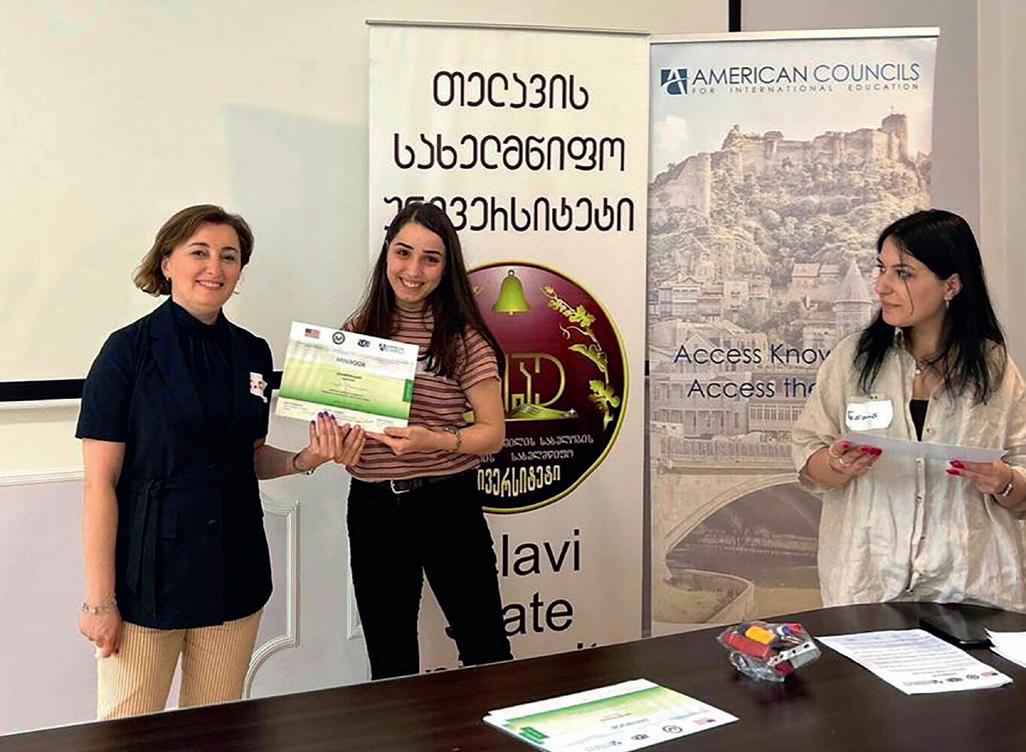
როგორია თქვენი სამომავლო გეგმები რეგიონების მიმართულებით?
სექტემბრიდან კვლავ განვაგრძობთ იმავე რეგიონებში ტოპ-მოთხოვნადი უნარების განვითარების პროგრამას სტუდენტებისთვის. ამავე ტრენინგის ფარგლებში აქტიურად ვმუშაობთ სტუდენტების სამომავლო საჭიროების გამოკვეთაზე. ჩვენი შემდგომი პროგრამებიც ზუსტად ამ საჭიროებას დაეფუძნება და მათი მიზანი ახალგაზრდების პროდუქტიულობის ზრდა და საზოგადოებრივ ცხოვრებაში მათი აქტიური ჩართულობის უზრუნველყოფა იქნება.
Each participant was particularly memorable to us for their strongly expressed individuality; however, we can single out one participant in particular who had certain neurodevelopmental difficulties. It was amazing to us how much she had read and studied on her own about her condition and how bravely and persistently she was able to cope with the challenges of everyday life. This person’s perseverance and curiosity can definitely be a role model for many of us.
What are your future plans for the regions?
From September, we will continue to develop the top-in-demand skills program for students in the same regions. Within the framework of the same training, we are actively working on defining the future needs of students. Our further programs will be based on this exact need, and their goal will be to increase the productivity of young people and ensure their active involvement in public life.

